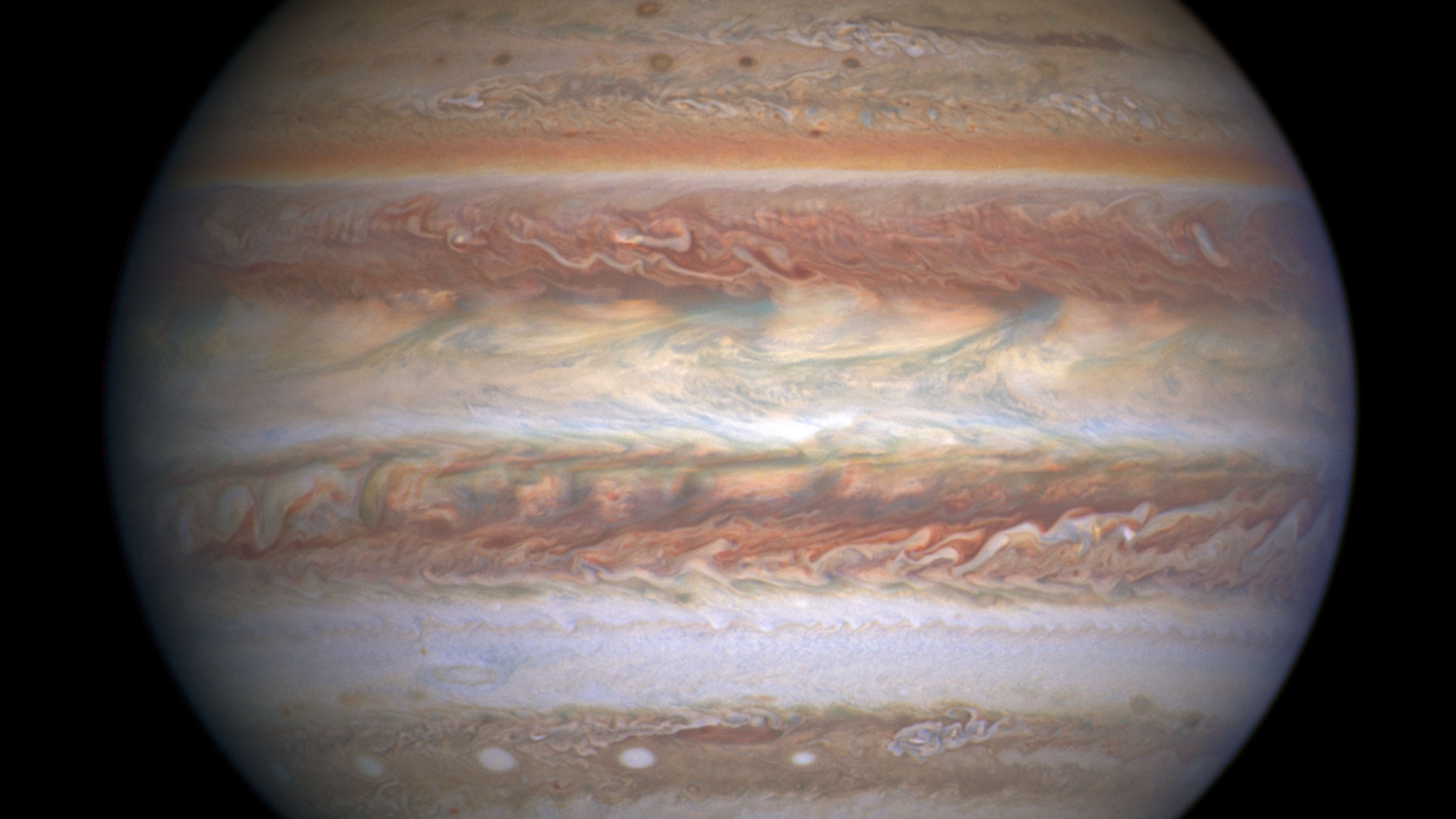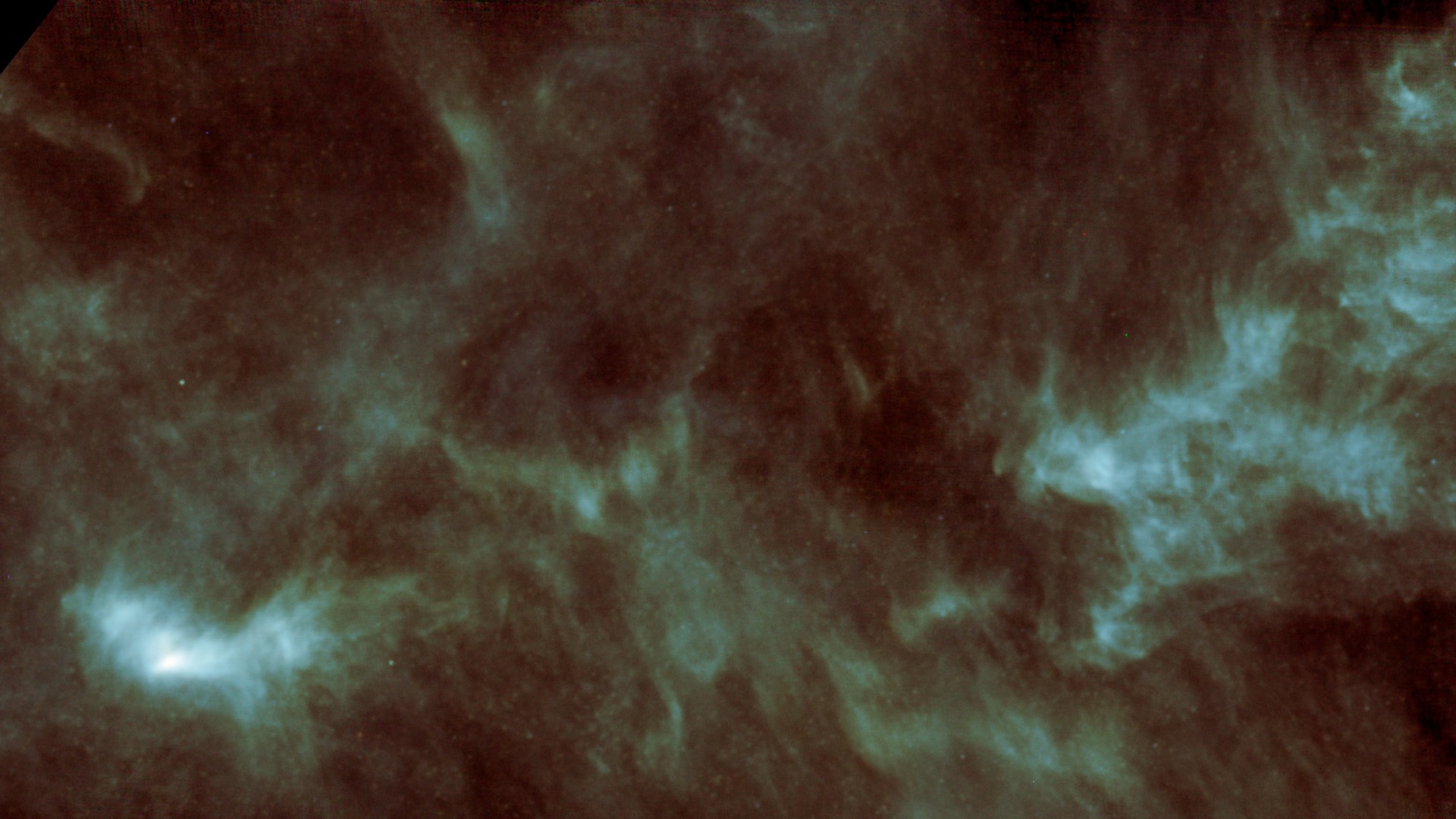Best binoculars for kids 2026: Small and lightweight binoculars for children of any age
Want to wow young stargazers with nature and the night sky? Here are our top picks of the best binoculars for kids.

Breaking space news, the latest updates on rocket launches, skywatching events and more!
You are now subscribed
Your newsletter sign-up was successful
Want to add more newsletters?

Delivered daily
Daily Newsletter
Breaking space news, the latest updates on rocket launches, skywatching events and more!

Once a month
Watch This Space
Sign up to our monthly entertainment newsletter to keep up with all our coverage of the latest sci-fi and space movies, tv shows, games and books.

Once a week
Night Sky This Week
Discover this week's must-see night sky events, moon phases, and stunning astrophotos. Sign up for our skywatching newsletter and explore the universe with us!

Twice a month
Strange New Words
Space.com's Sci-Fi Reader's Club. Read a sci-fi short story every month and join a virtual community of fellow science fiction fans!
Watching children soak up knowledge about the night sky is a wonderful experience and the best binoculars for kids can offer them a chance to get up close and personal with the universe they're in. Your budding astronomers have ample opportunities over the coming weeks to see some spectacular night sky events — our skywatching highlights section outlines what you can expect to see. If you want more ideas for observation targets, we have a regularly updated night sky guide that has a breakdown of skywatching for the whole month.
All of the binoculars selected for this guide are robust and child-friendly. The best binoculars for kids can also be used for nature watching, if your children prefer daytime activities. For older children, the best night vision binoculars may offer them a chance to experience wildlife at night, or the best compact binoculars might be a good choice if they're keen to carry them around on the off-chance of a good find.
Best binoculars for kids that we recommend 2026
Why you can trust Space.com
Best overall
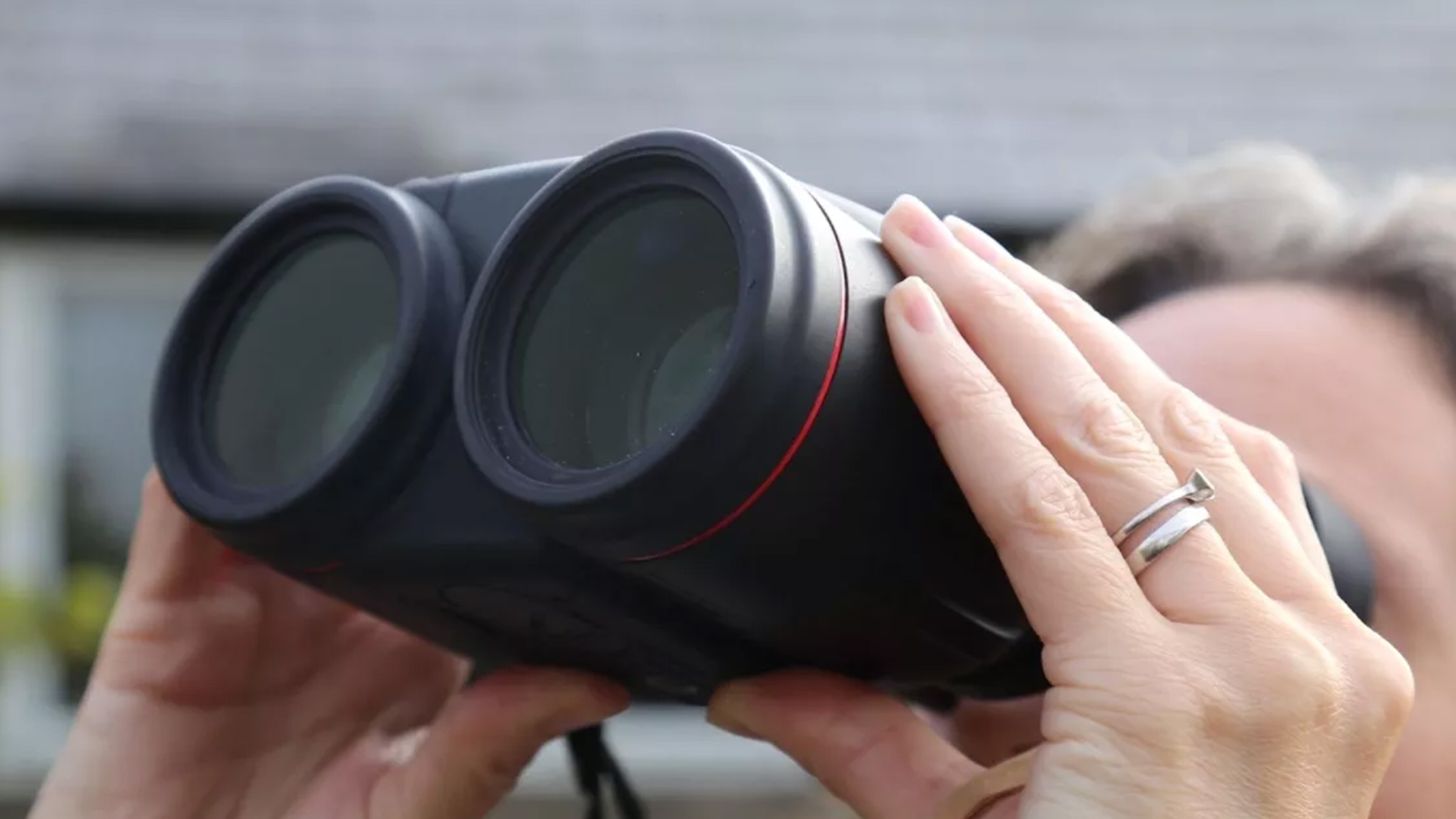
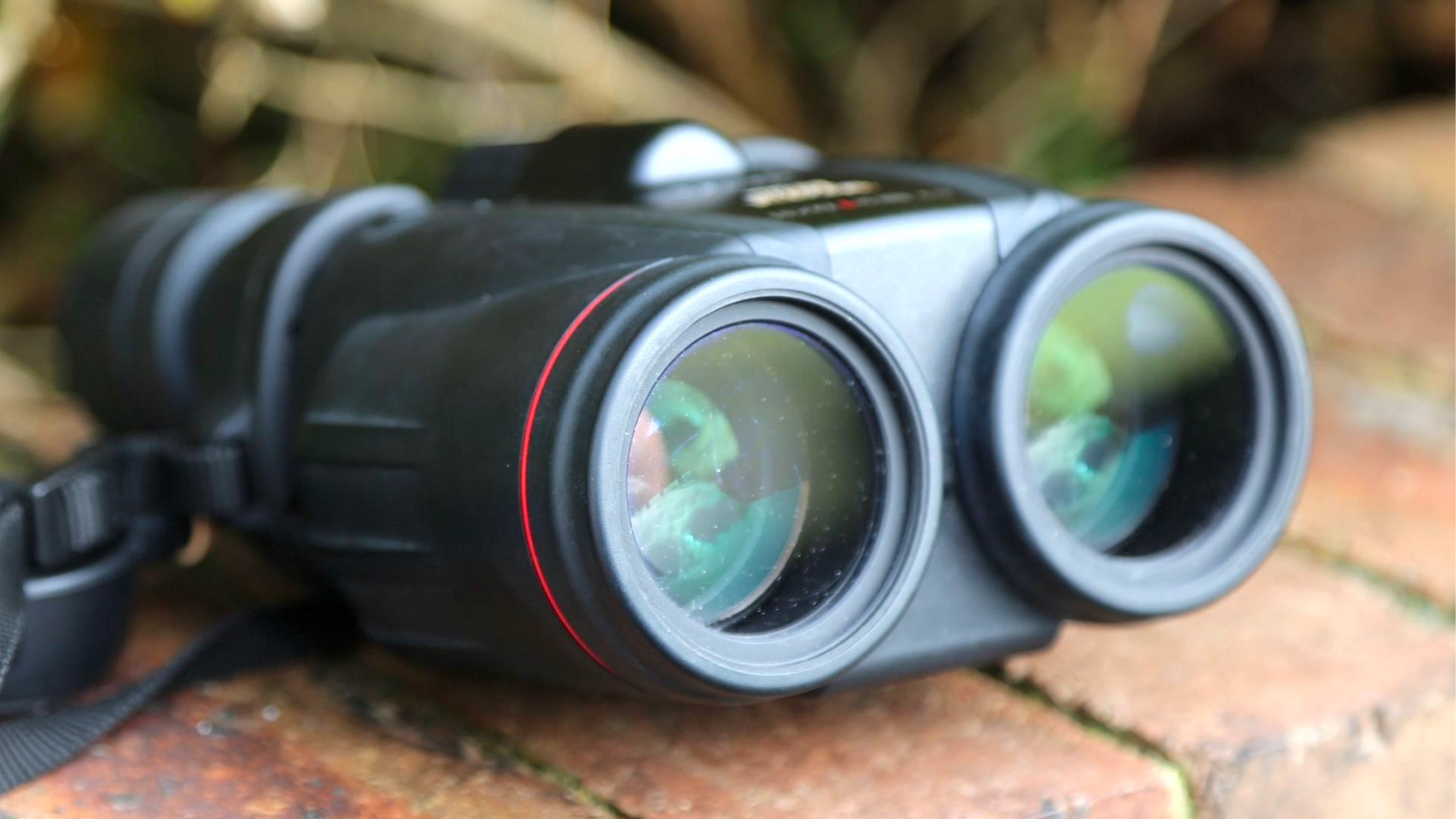
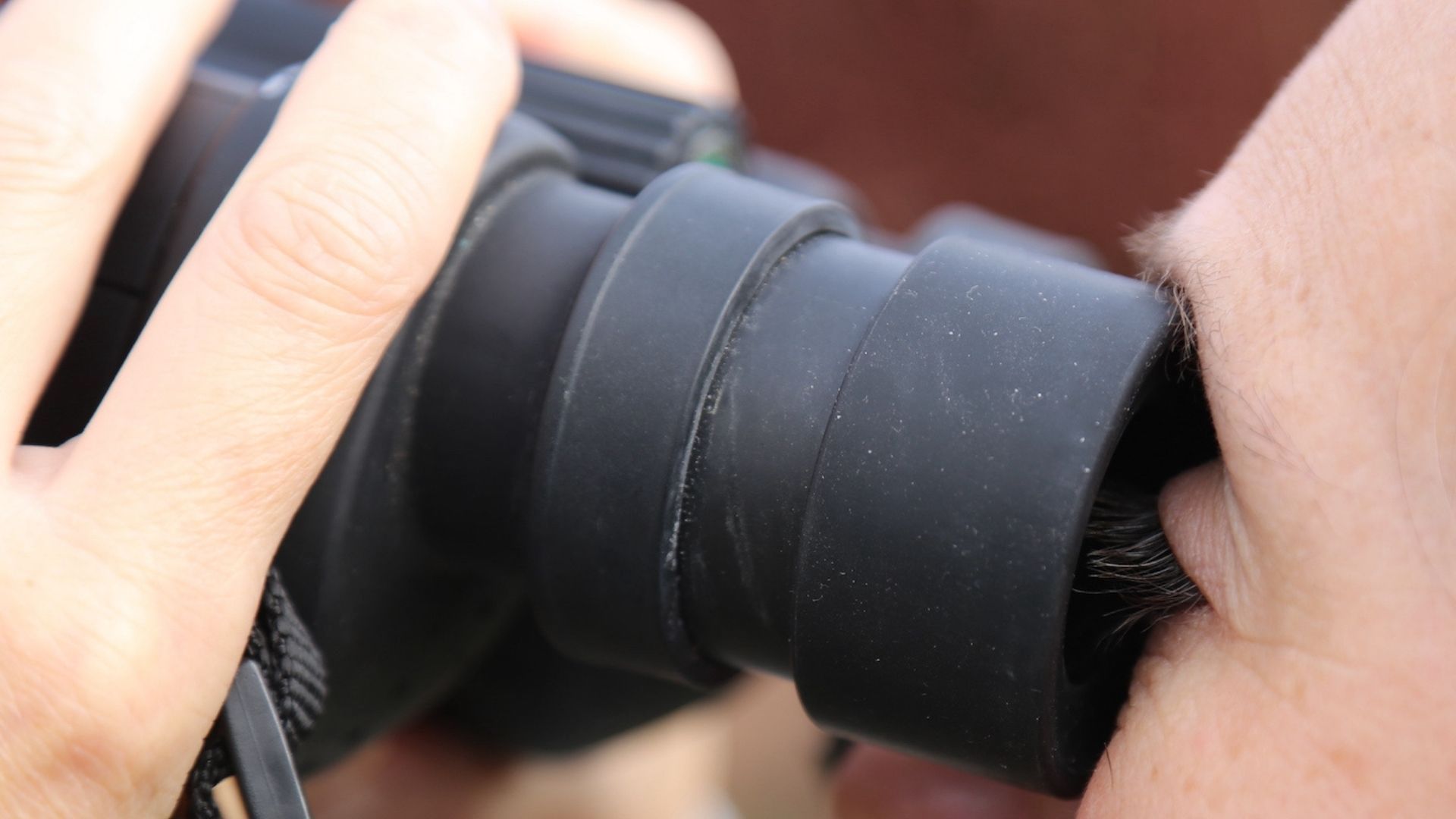
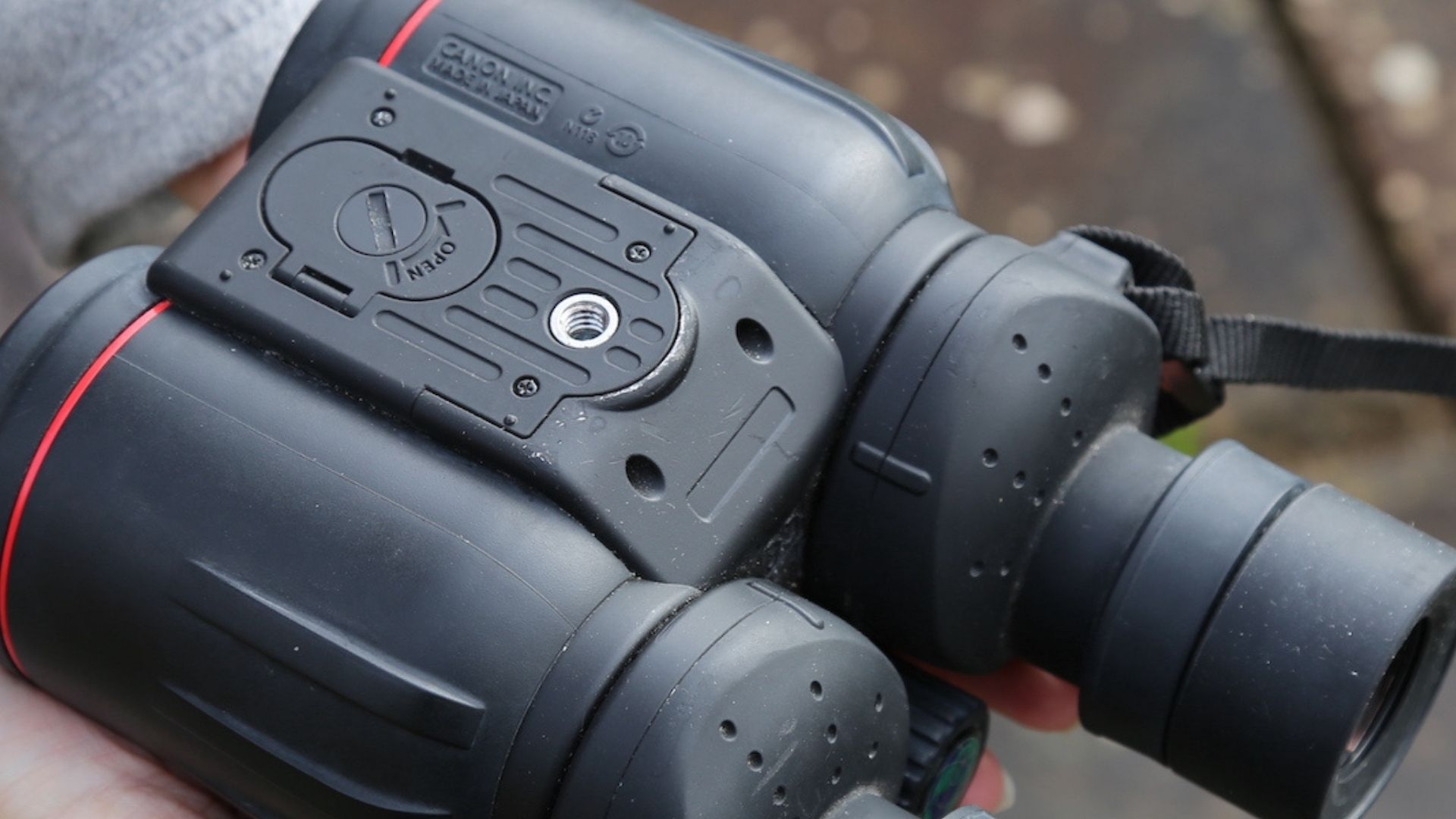
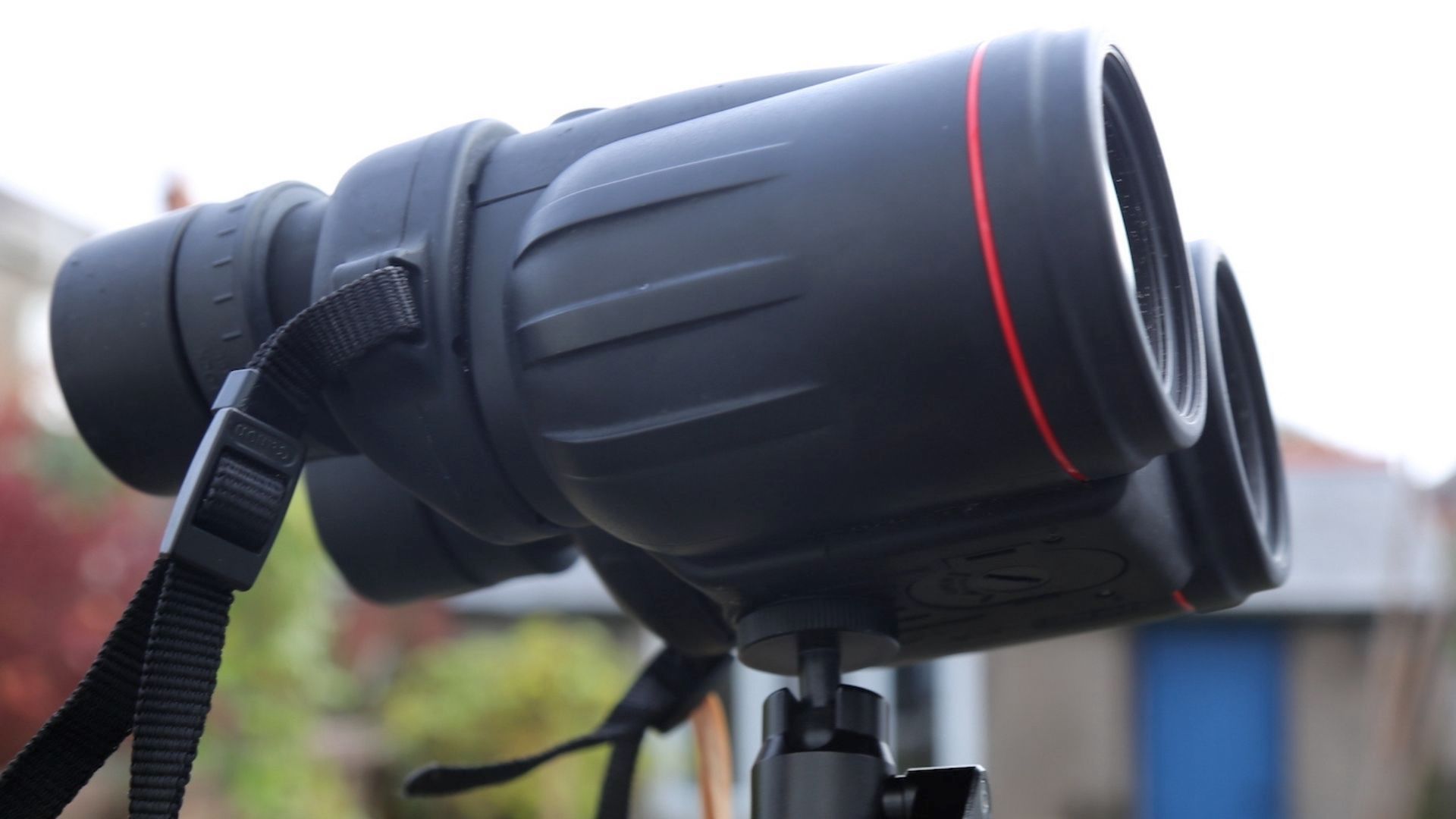
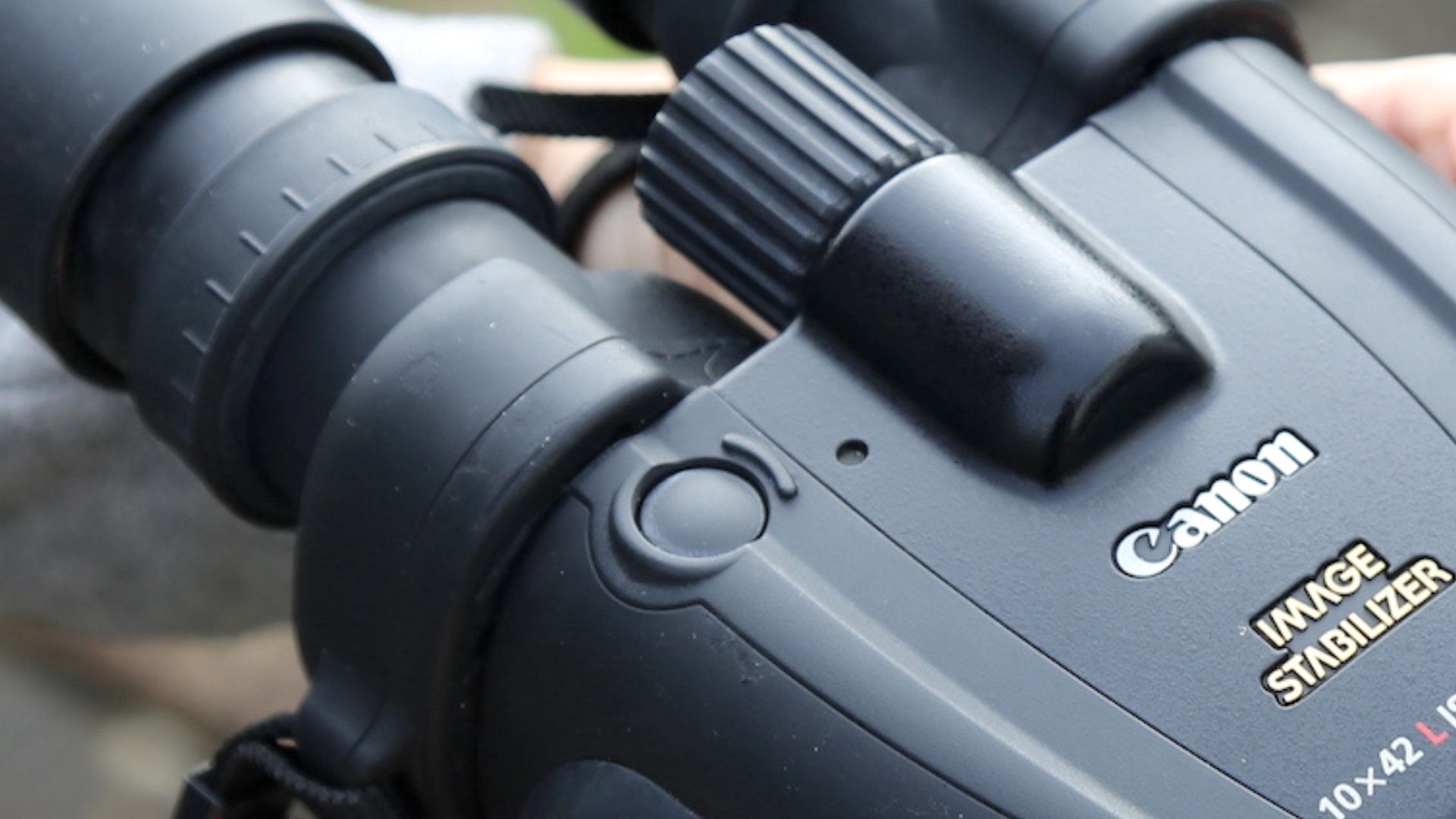
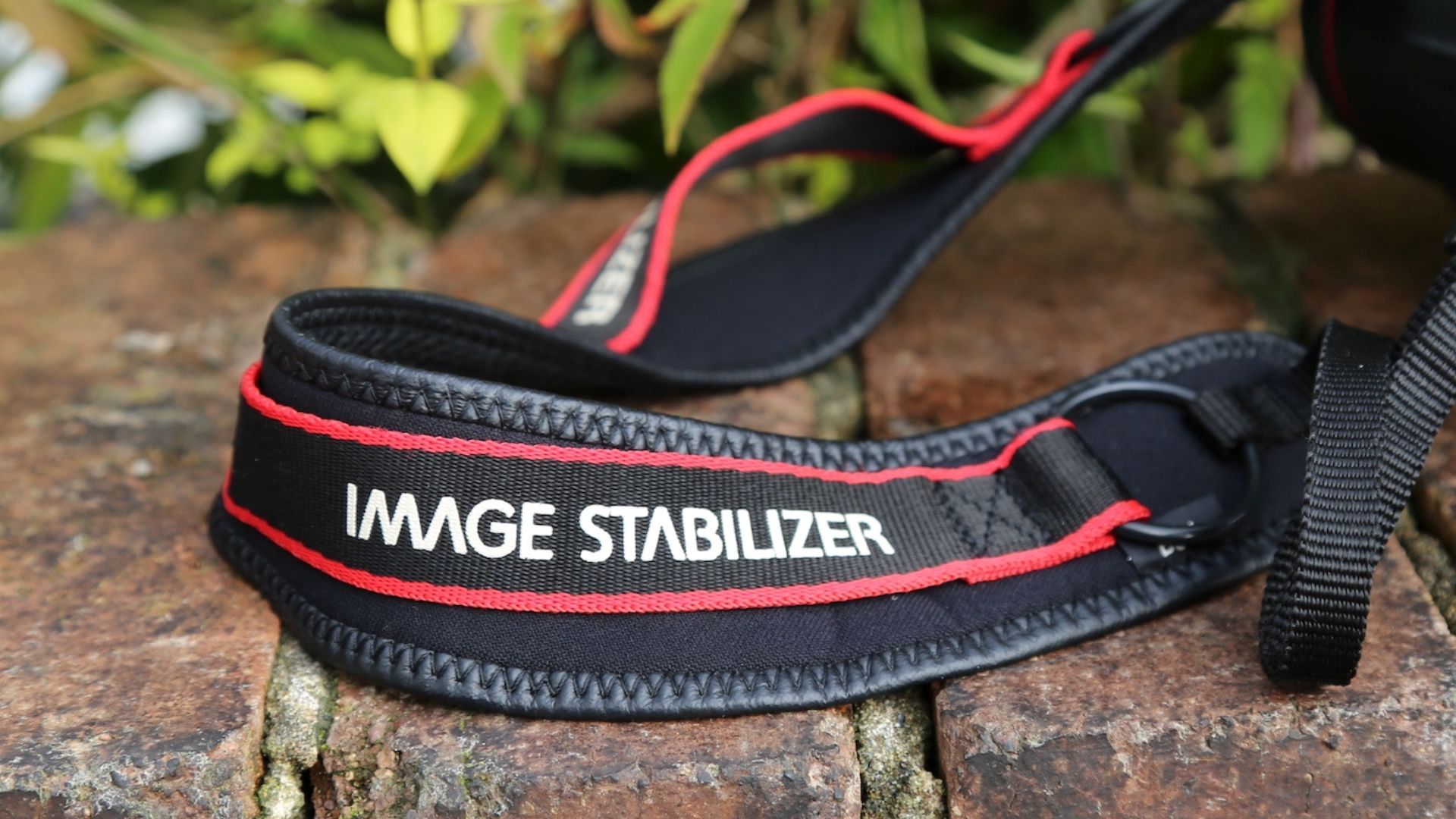
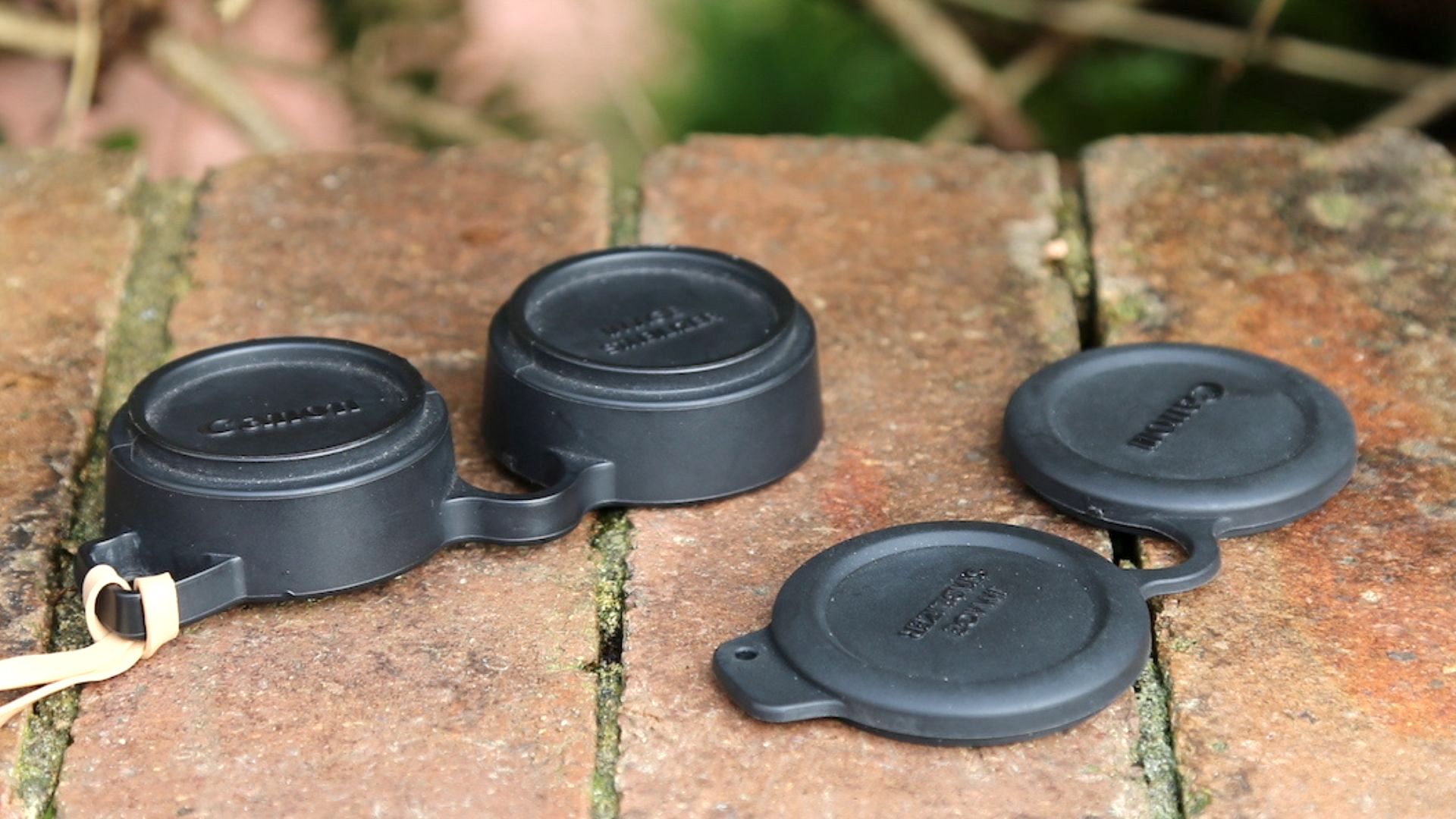
Canon 10x42L IS WP Binocular
Our expert review:
Specifications
Reasons to buy
Reasons to avoid
✅ Your child will benefit from built-in image stabilization: These are the only binoculars on this list with built-in image stabilization — view the stars, wildlife, sports events and concerts without any wobble!
✅ You can afford to: Chances are if you're looking for 'kid-specific' binoculars, you won't want to spend a lot. But if you're lucky enough to have the budget to get the best of the best, you won't be disappointed.
❌ Your child wants to use binoculars unsupervised: We strongly recommend these binoculars are used under supervision and with the neck strap attached to prevent drops and breakages.
❌ Your child won't use them often: They are a big investment, so if your child won't get much use from them, opt for a much cheaper pair.
🔎 Canon 10x42L IS WP Binocular: Pricey but almost perfect for hand-held astronomy. In a market saturated with low-priced astronomy-centric binoculars, some clear, sharp and high-resolution optics and image stabilization wizardry make the waterproof Canon 10x42L IS WP binoculars expensive but worth it. ★★★★★
We're taking a bit of a risk by naming the Canon 10x42L IS WP binoculars as the best binoculars for kids. After all, their price tag far, far exceeds what you're probably expecting to spend on some binoculars that your youngster may or may not love. We agree: these are very expensive, and if your child isn't sure yet whether they're interested in stargazing or nature-spotting, it's probably not a wise purchase. But if your youngster is committed, and you want them to have the very best? You won't be disappointed.
Just why are the Canon 10x42L IS WP binoculars so expensive? It's because they have built-in image stabilization (IS). It's a technology you'll find in expensive camera lenses which makes the view in the lens stable even if you're not using a tripod. Holding binoculars still is challenging, especially for a child, and with a 10x magnification, you'll almost always need a tripod. But these Canon binos do away with the need for additional stability, allowing for sharp, wobble-free views in even the smallest of hands.
There's a reason we gave these binos five stars in our Canon 10x42L IS WP review—lots of reasons, in fact. We'd go as far as to say that anyone who uses them, kids or adults, will be amazed by their capabilities. But since this is a specialist (and therefore expensive) piece of technology, we wouldn't recommend children use them without supervision. We'd also recommend using a neck strap at all times to prevent accidental drops.
As for the actual technology supporting the Canon 10x42L IS WP binoculars, you've got gyroscopic sensors on board to detect any wobbling or shaking. If there is any wobble detected, actuators around the lenses of the binoculars move the lens in such a way as to counteract the wobble. This stabilization (which requires two AAA batteries, just so you know) is just one of the reasons why these binoculars produce pin-sharp images.
Whether you're looking at the moon, Jupiter or star clusters, you and your family are going to be treated to genuinely incredible views. It's not just the image stabilization you're paying for — inside are the ultra-low dispersion glass lens elements and 'Super Spectra' lens coatings.
- Read our full Canon 10x42L IS WP binoculars review
Attributes | Notes |
|---|---|
Design | Waterproof design |
Performance | Bright and colorful images |
Functionality | Image stabilization provides steady views |
Best for detail
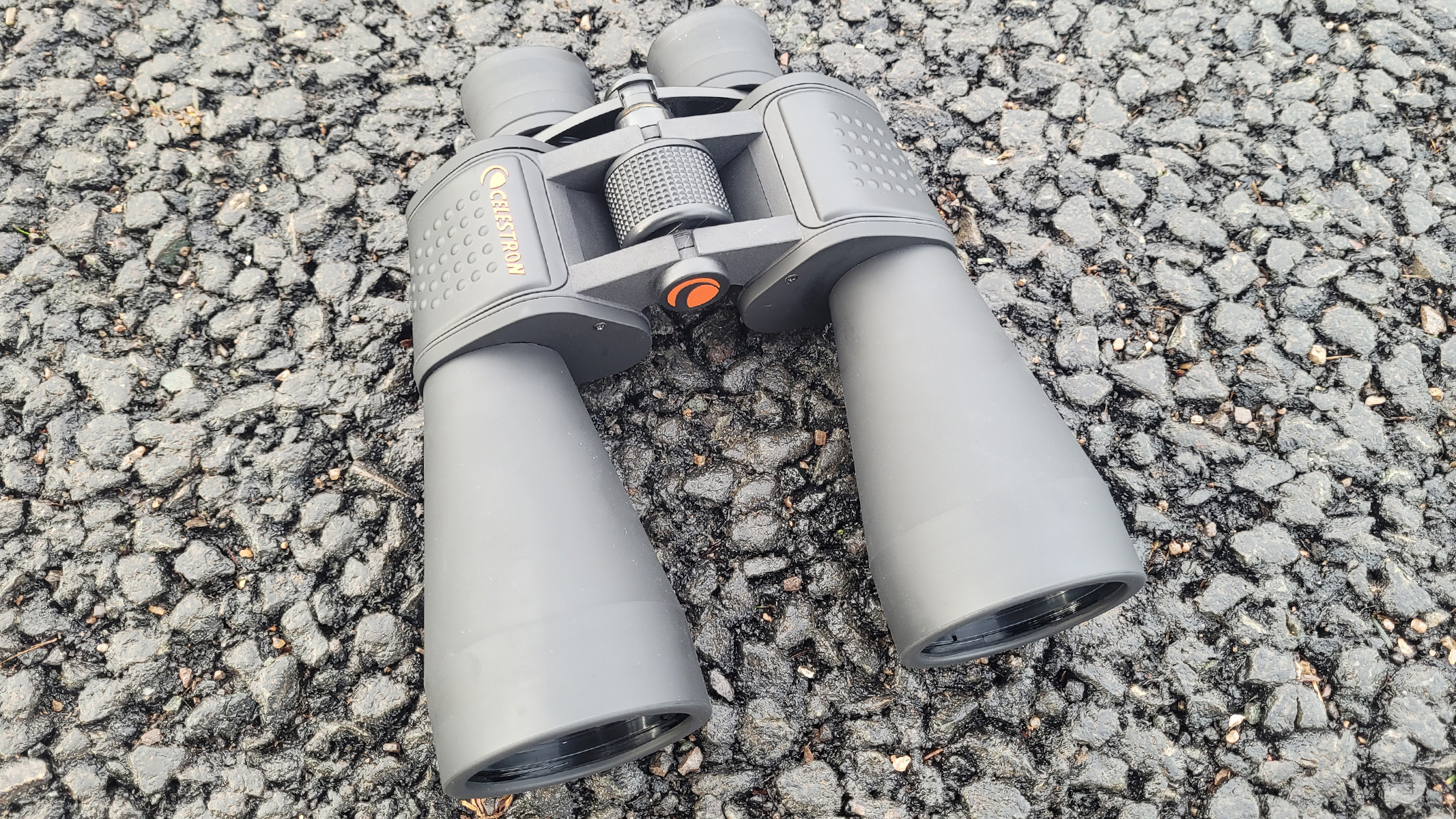
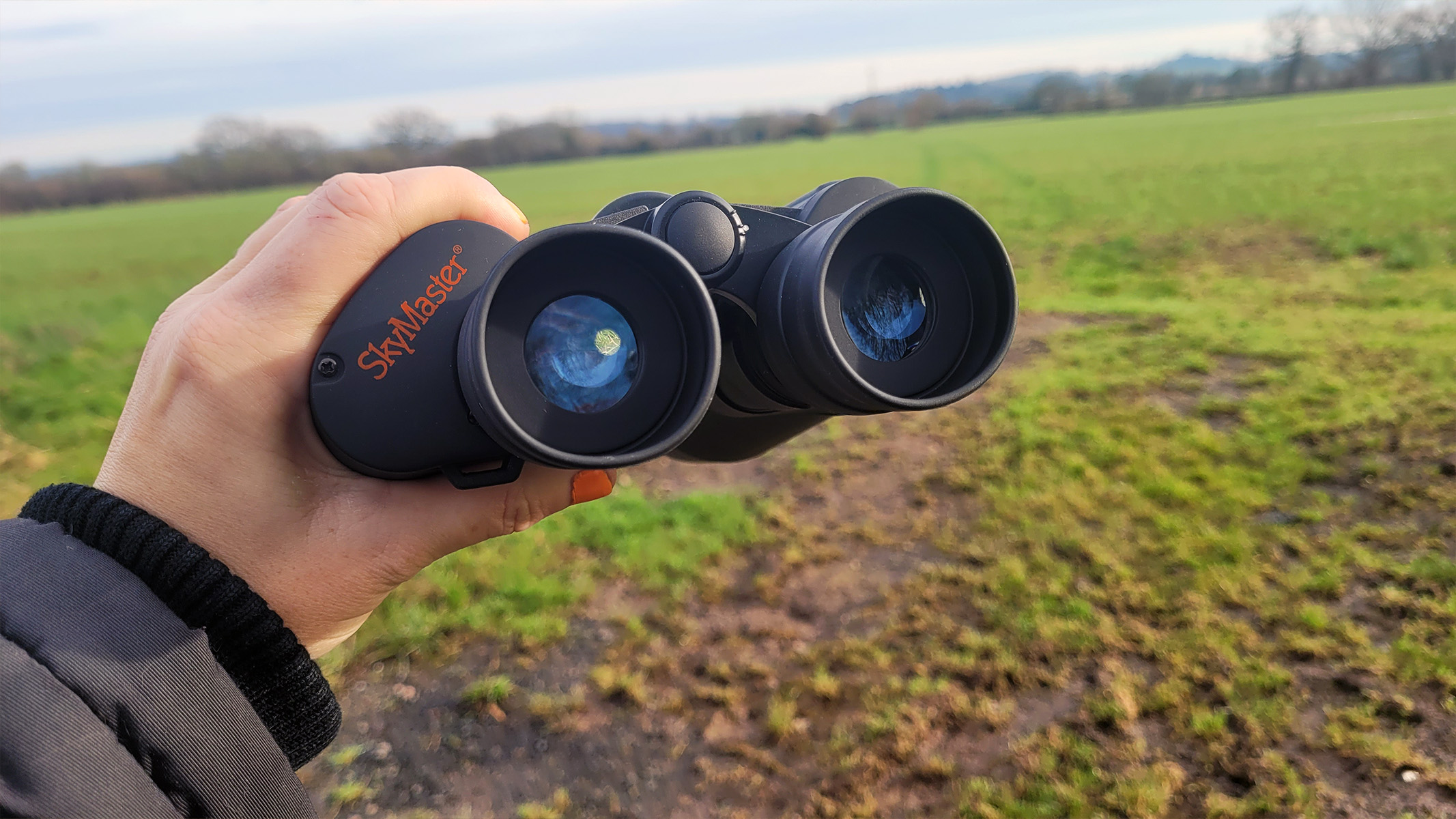
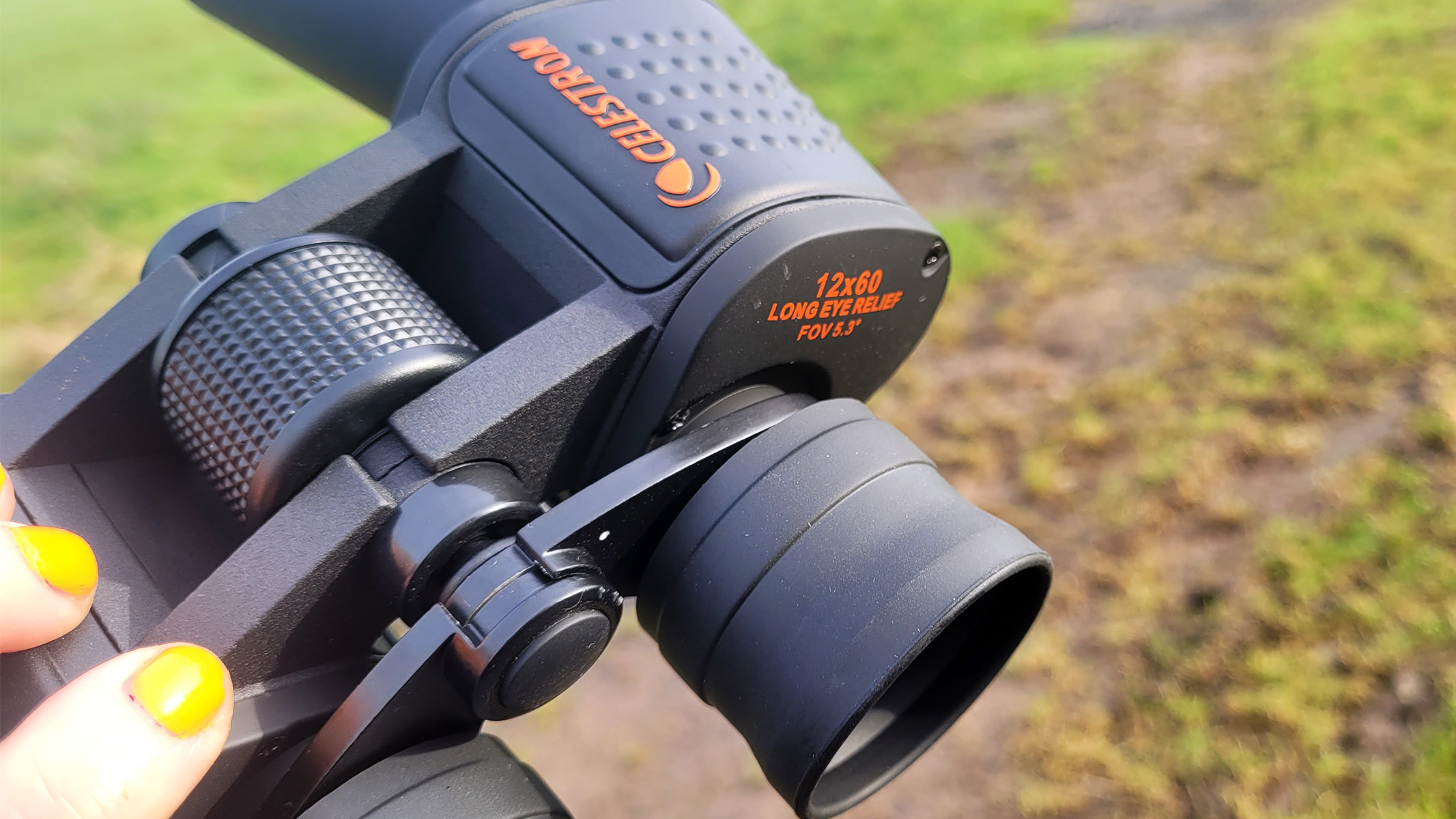
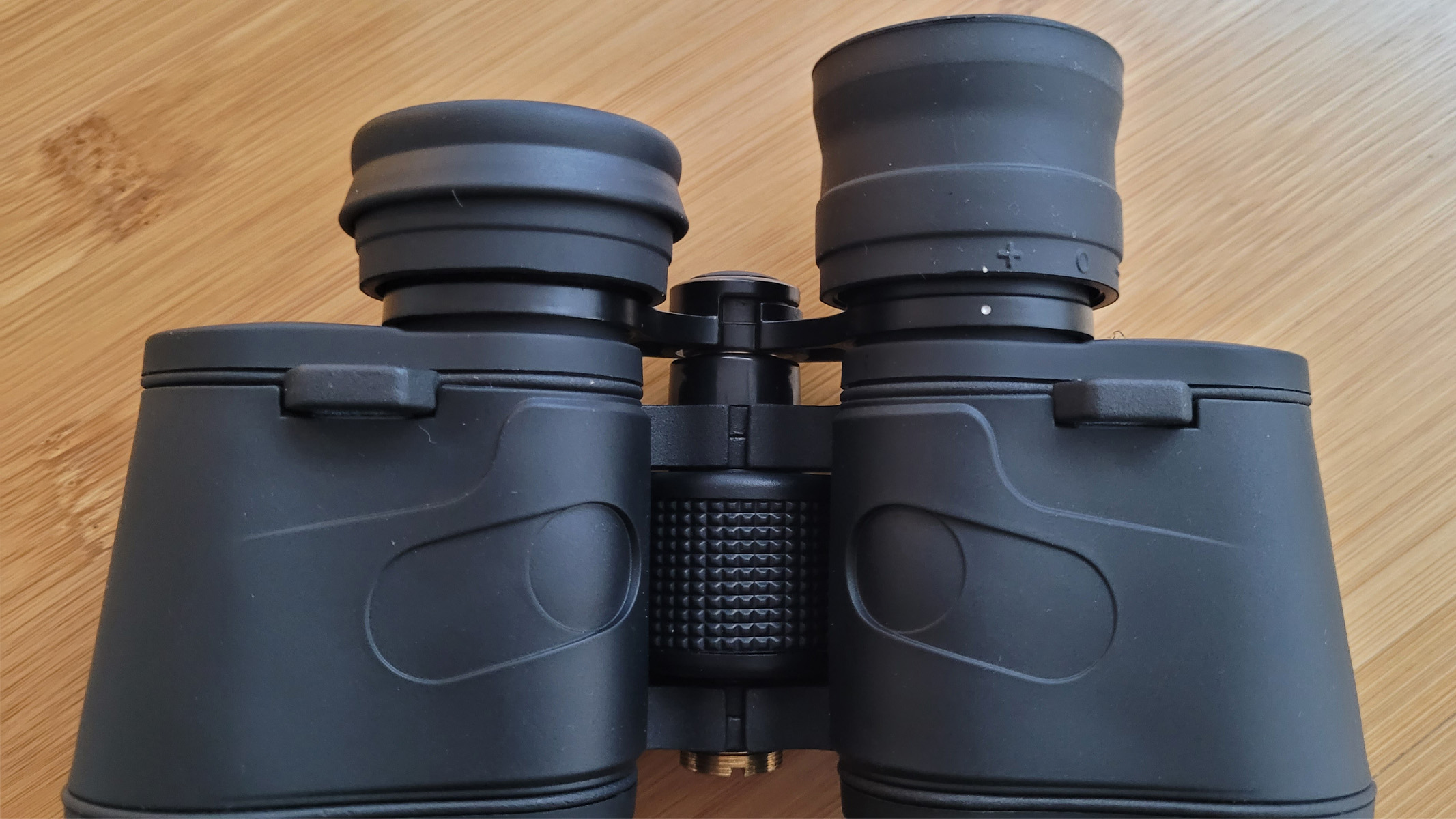
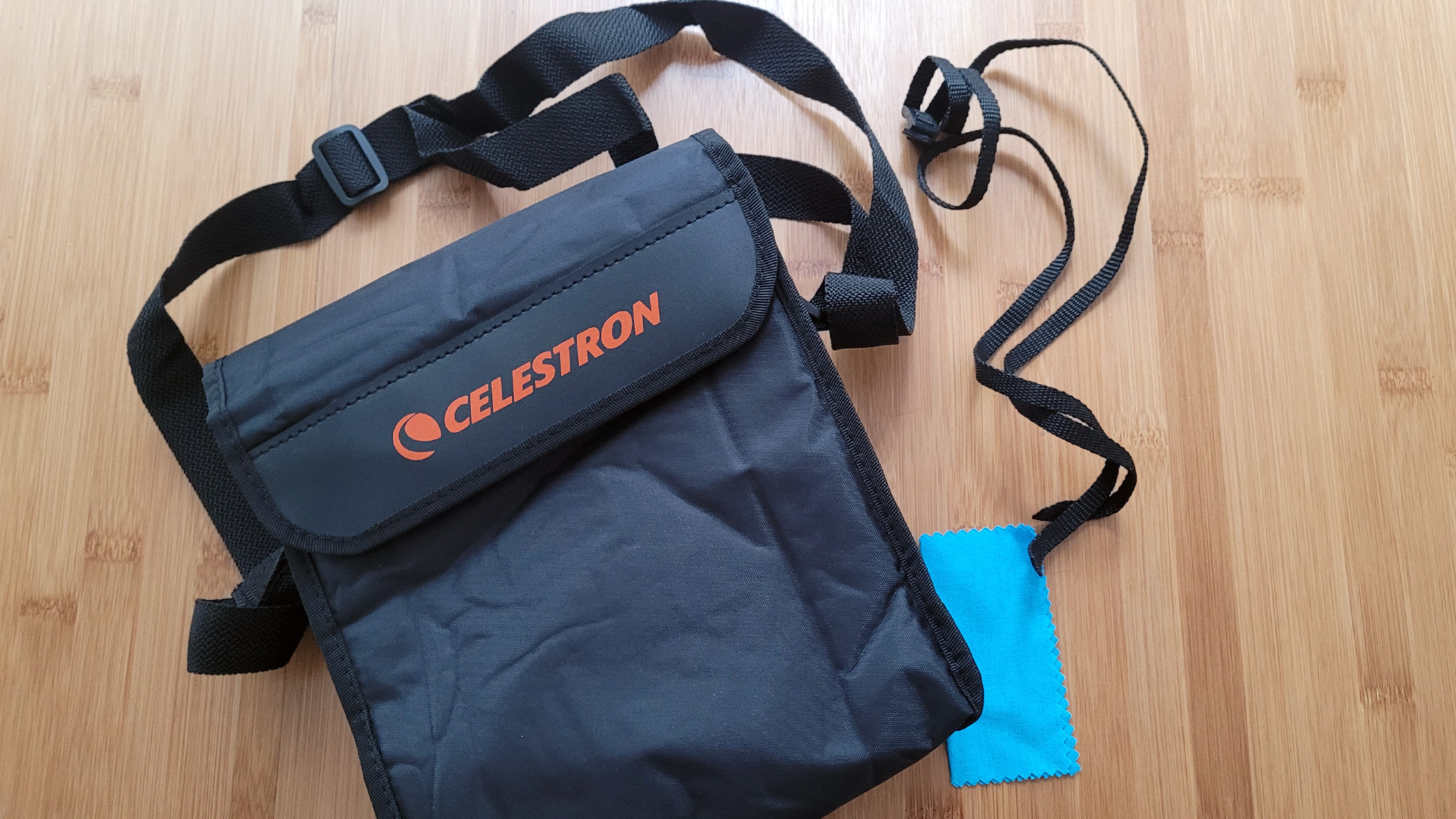
The Celestron SkyMaster 12x60 ships with a soft carry case, neck strap and a lens cleaning cloth.
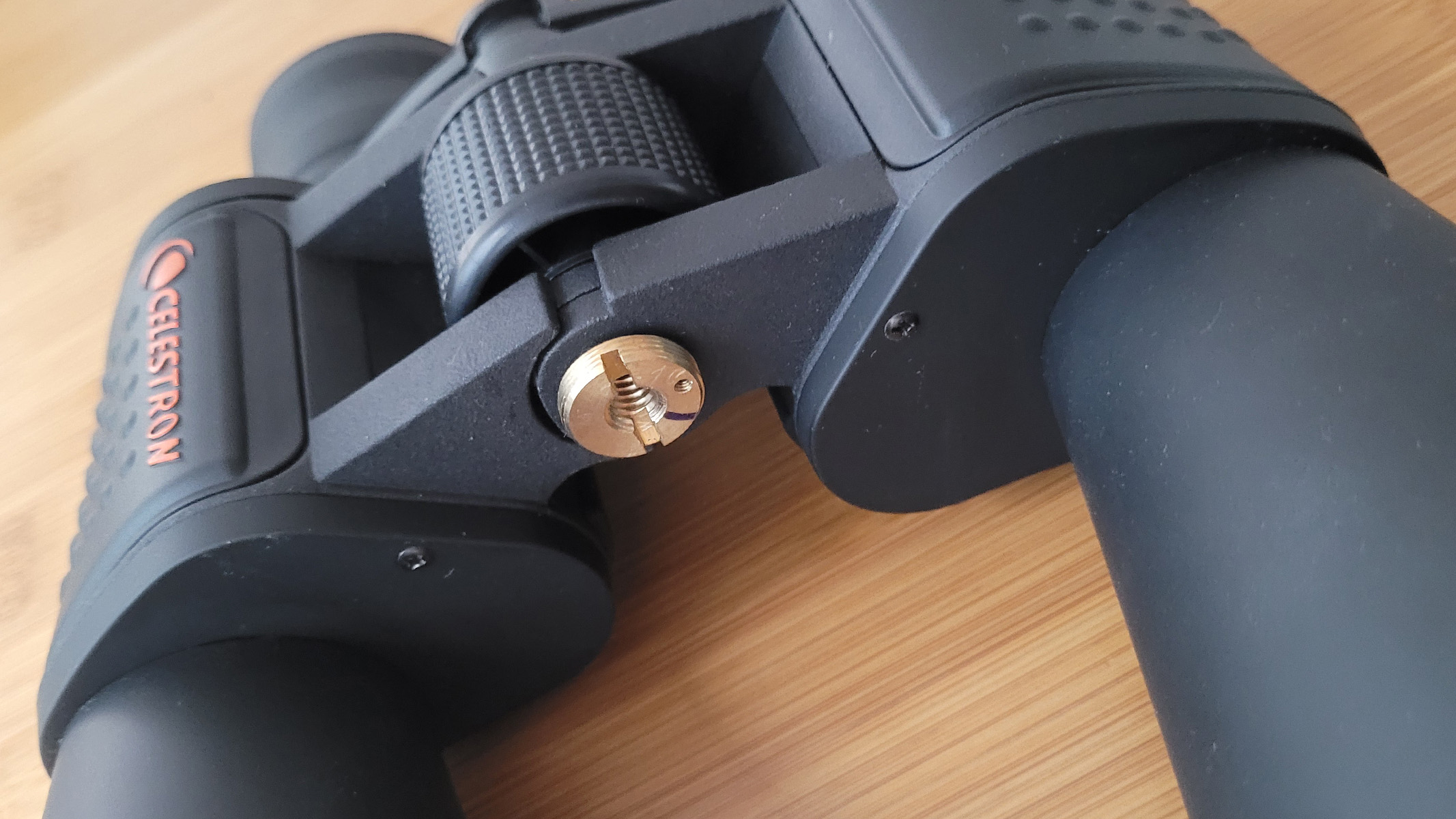
Celestron SkyMaster 12x60 Binocular
Our expert review:
Specifications
Reasons to buy
Reasons to avoid
✅ Your child wears spectacles: The eye relief is a generous 17mm so these are comfortable for glasses wearers.
✅ You want to stargaze with them: The huge aperture drinks in loads of light and can be used for deep sky astronomy.
❌ You want something lightweight and portable: These binos weigh over 2.2 lb / 1kg.
❌ You don't want to buy a tripod: The amount of wobble caused by the 12x magnification is too big to enjoy the views for any length of time without leaning them on something. In reality, this means purchasing a tripod.
🔎 Celestron SkyMaster 12x60 Binocular: Great value for an excellent pair of low-light-friendly binoculars with fantastic specs and a quality design. The tripod adapter is especially welcome given the high magnification. ★★★★½
Whilst they wouldn't be best-suited to younger kids due to their hefty weight and size, the Celestron SkyMaster 12x60 binoculars are an extremely good buy for older kids and teenagers who are looking for the most detailed views. Coming from Celestron, one of the leading astronomy brands, they are particularly ideal for stargazing thanks to their huge 60mm objective lenses and 12x magnification power.
The multi-coated optics offer stunning views thanks to their use of high-density BaK-4 glass, which is much better than the BK-7 glass that is often used in more affordable binoculars. The 60mm objective lenses soak up a huge amount of light and make it easy to pick out Jupiter and the four Galilean moons: Io, Europa, Ganymede and Callisto. The wide view also makes it easy to scan the sky for star clusters like The Pleiades (Seven Sisters) and galaxies like Andromeda. With the 12x magnification, young stargazers will be able to enjoy spotting craters on the moon, too.
These binoculars offer similarly impressive views during the day, bringing even the most distant objects into sharp detail. However, their Porro prism design means that they're quite bulky and heavy to carry around with you. The 12x magnification also requires an extremely steady hand, so we'd recommend investing in a tripod and adapter to use with these binoculars for the best views, especially since the neck strap is a bit thin to be comfortable during prolonged use. But with the right setup, these will offer your kids the most detailed views on this list and brilliant optics at an affordable price.
In our Celestron SkyMaster 12x60 review we thought these were seriously impressive binoculars for the money. They have excellent build quality, with a protective rubber coating to help them withstand knocks and non-slip grips to make them feel nice and secure in the hand. They're fog and water-resistant and feature a generous 17mm of eye relief, meaning that glasses-wearers can comfortably use them by folding down the rubber eyecups.
- Read our full Celestron SkyMaster 12x60 binocular review
Attributes | Notes |
|---|---|
Design | Excellent build quality |
Performance | Excellent light transmission |
Functionality | Generous 17mm eye relief |
Best for all-weather use
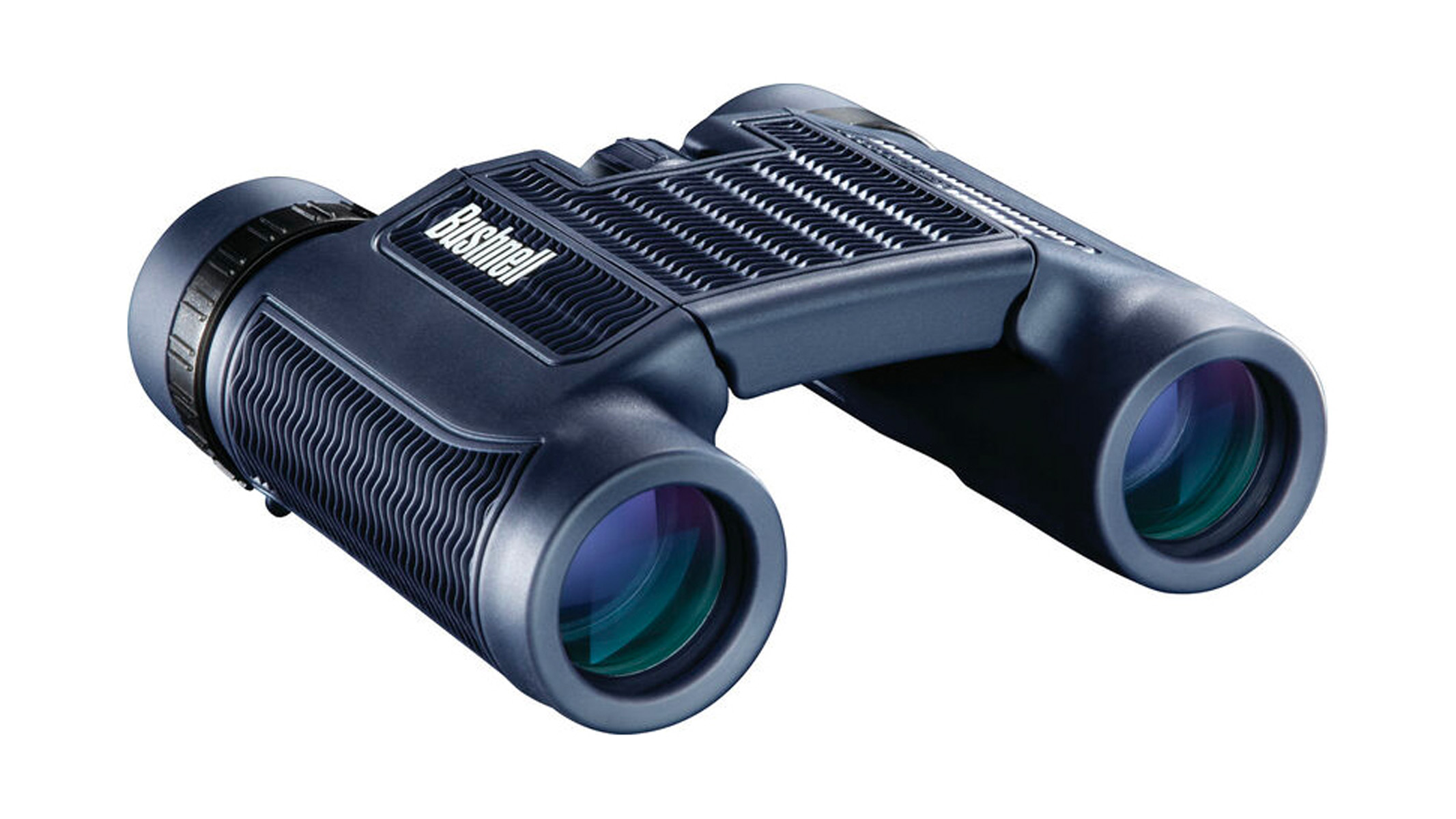
Bushnell H20 8x25
Our expert review:
Specifications
Reasons to buy
Reasons to avoid
✅ You're looking for an all-weather pair that can stand up to punishment: These are fog-proof and water-proof and impressible durable with it.
✅ You're on a budget: While these are a quality pair of binos, they won't break the bank.
❌ You're buying a pair for very young children: At 290g, these may be a little too heavy for very young children, and there are lighter models available.
🔎 Bushnell H20 8x25: These binoculars are water and fog proof and rugged and durable with it. While they could be lighter, they're still compact enough for most children to use. ★★★½
The Bushnell H20 8x25 compact binoculars are an impressively specced pair of binoculars, considering their price. They boast BaK-4 roof prisms and full multi-coating and a 6.9-degree field of view, ensuring you'll get a full, clear and sharp view of whatever you point them at.
They're water and fog proof and also extremely easy to use. The center focus knob is easy to grip and adjust, even while wearing gloves, a real boon for children. Their grip-friendly rubberised and textured coating means they should also stand up to being dropped or bumped.
With just 12mm of eye relief, they may not be ideal for spectacle wearers and they're also slightly heavier than some other models at 290g, so children might need help carrying them. But they're still compact enough for most children to use and if you're looking for a child-friendly all-weather pair of binos, these are a worthy purchase.
Attributes | Notes |
|---|---|
Design | Hardy and waterproof. |
Performance | Multi-coated and BAK4 glass. |
Functionality | Eye relief a little short. |
Best all-rounders
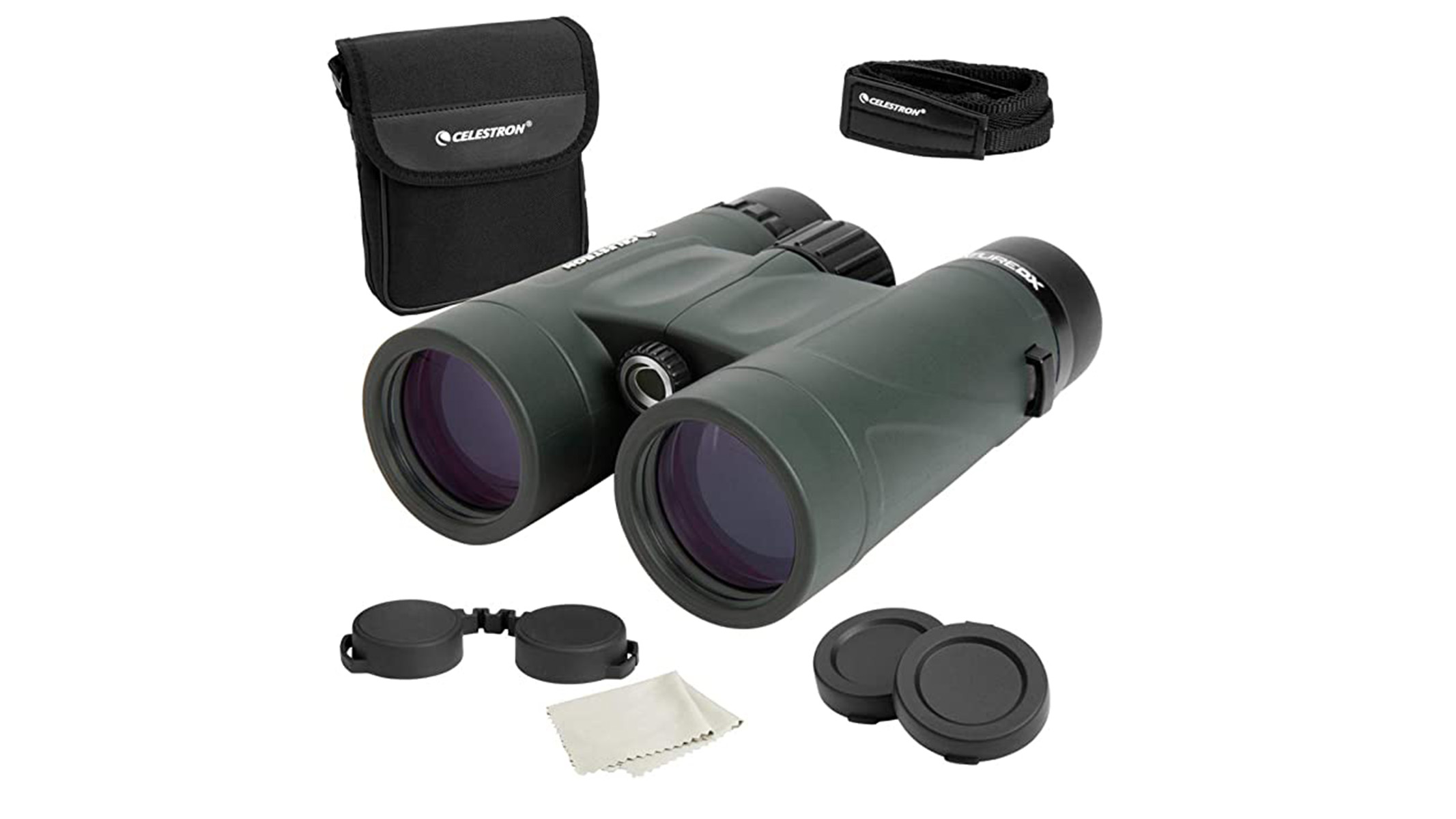
Celestron Nature DX 8x32 Binocular
Our expert review:
Specifications
Reasons to buy
Reasons to avoid
✅ You're looking for a good all-rounder: These are general-purpose binoculars that can be used day and night in any weather.
✅ You want to share the views with others: They are tripod mountable so once you've had a look at what's in the field of view, you can show someone else without them having to readjust.
❌ You want something stargazing specific: These are a generalist pair for casual observations. Though you'll be able to get good views of the moon and other bright celestial subjects, you'll want something with a bigger aperture for stargazing.
🔎 Celestron Nature DX 8x32 Binocular: A great all-round pair that will see you through many years of stargazing as well as wildlife watching and getting closer to sporting action. ★★★★
We've chosen the Celestron Nature DX 8x32 as one of the best pairs of binoculars for kids for multiple reasons. First, they're lightweight, making them suitable for smaller hands. They're coated with a tough, grippable material, too, meaning they'll sit comfortably in a child's hands without slipping out. Their waterproof coating helps give them some additional resistance, too, meaning they won't be affected by rain or a bit of a splash.
We're pleased that these binoculars have a built-in tripod mount, something that's not all that usual in a pair this size. Their 8x magnification means that extra stability is often needed to get the best views. Mounting binos is also a good idea if views are going to be shared between the family or a group of kids: everyone can take a look without needing to refocus.
We particularly like how comfortable these binoculars are to use. The Celestron Nature DX 8x32 have a larger eye relief (17.5mm), which makes them great for glasses users. The BaK-4 prisms ensure great contrast and sharp images, too. Couple that with the multi-coated lenses and you're going to get excellent light transmission.
However, it's probably the fact that the Celestron Nature DX 8x32 binoculars can be used so easily for a variety of purposes that makes them so easy to recommend. Despite coming from Celestron, they aren't necessarily made for stargazing — they're part of Celestron's 'Nature' range, meaning they're designed for watching wildlife. But we've found them suitable for both tasks, just as long as you're not hoping to achieve deep sky views.
- Take a look at our Celestron telescope and binocular deals hub
Attributes | Notes |
|---|---|
Design | Waterproof design |
Performance | Versatile for day and night |
Functionality | Not designed specifically for skywatching |
Best for the whole family
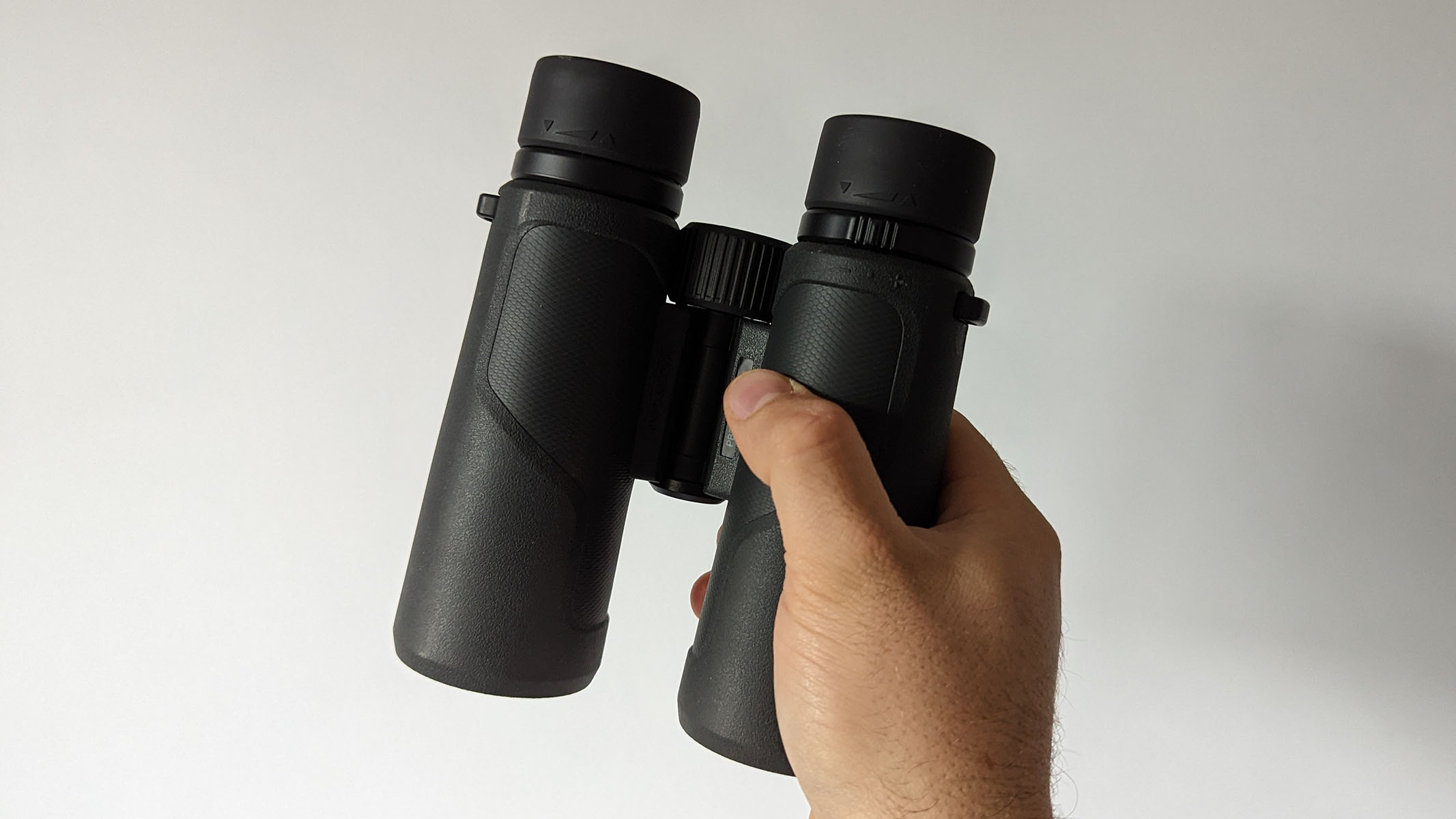
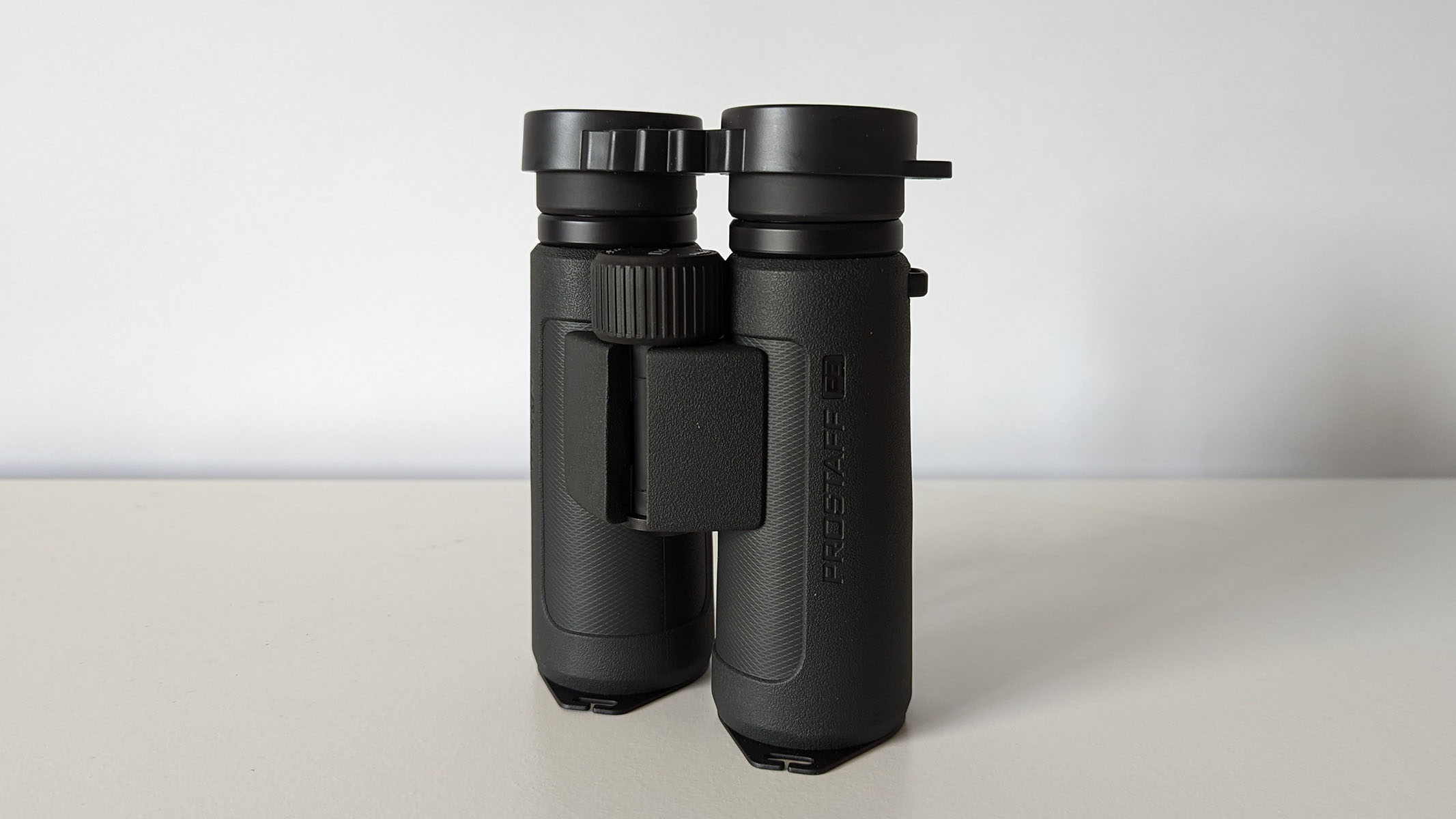
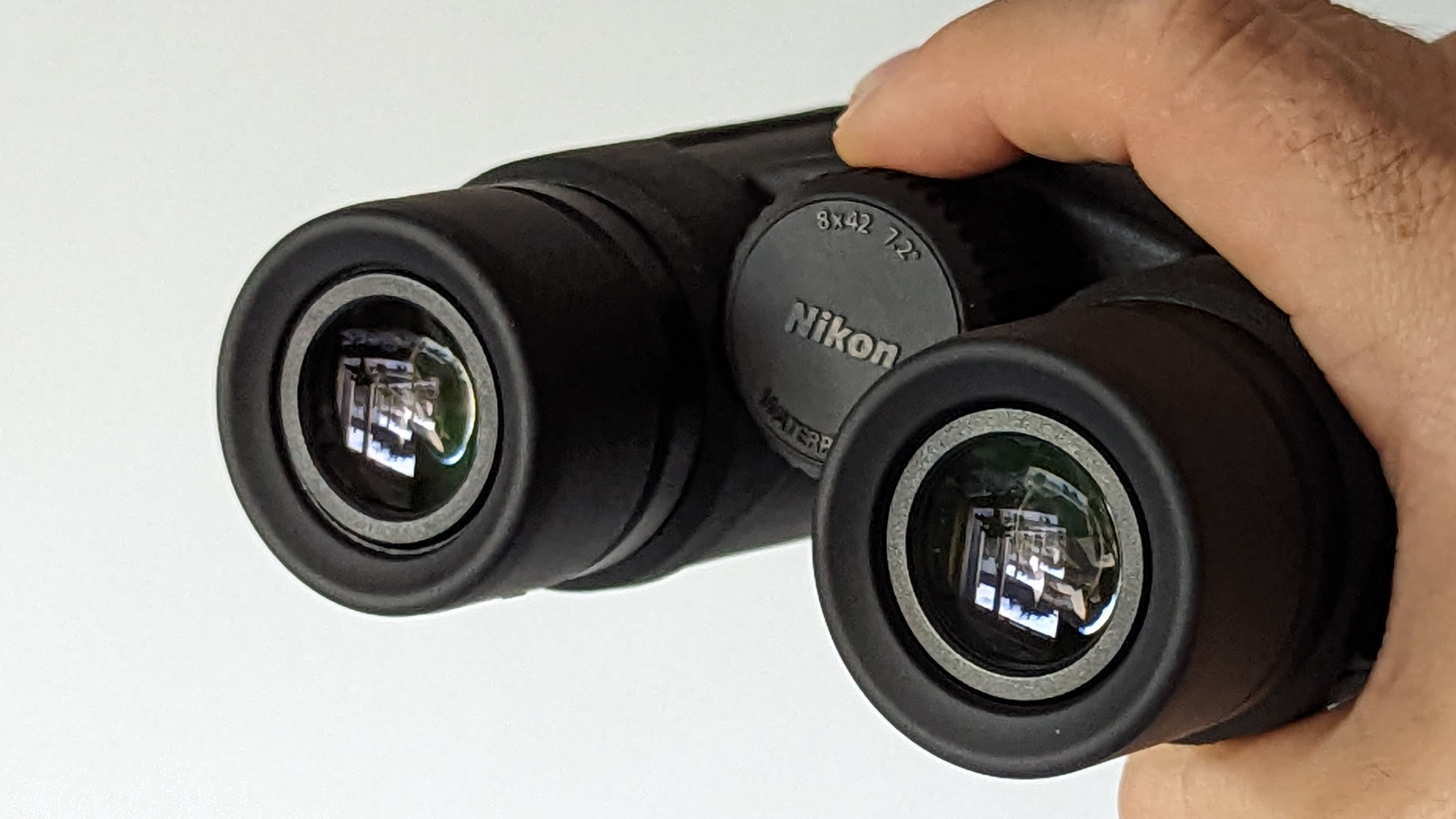
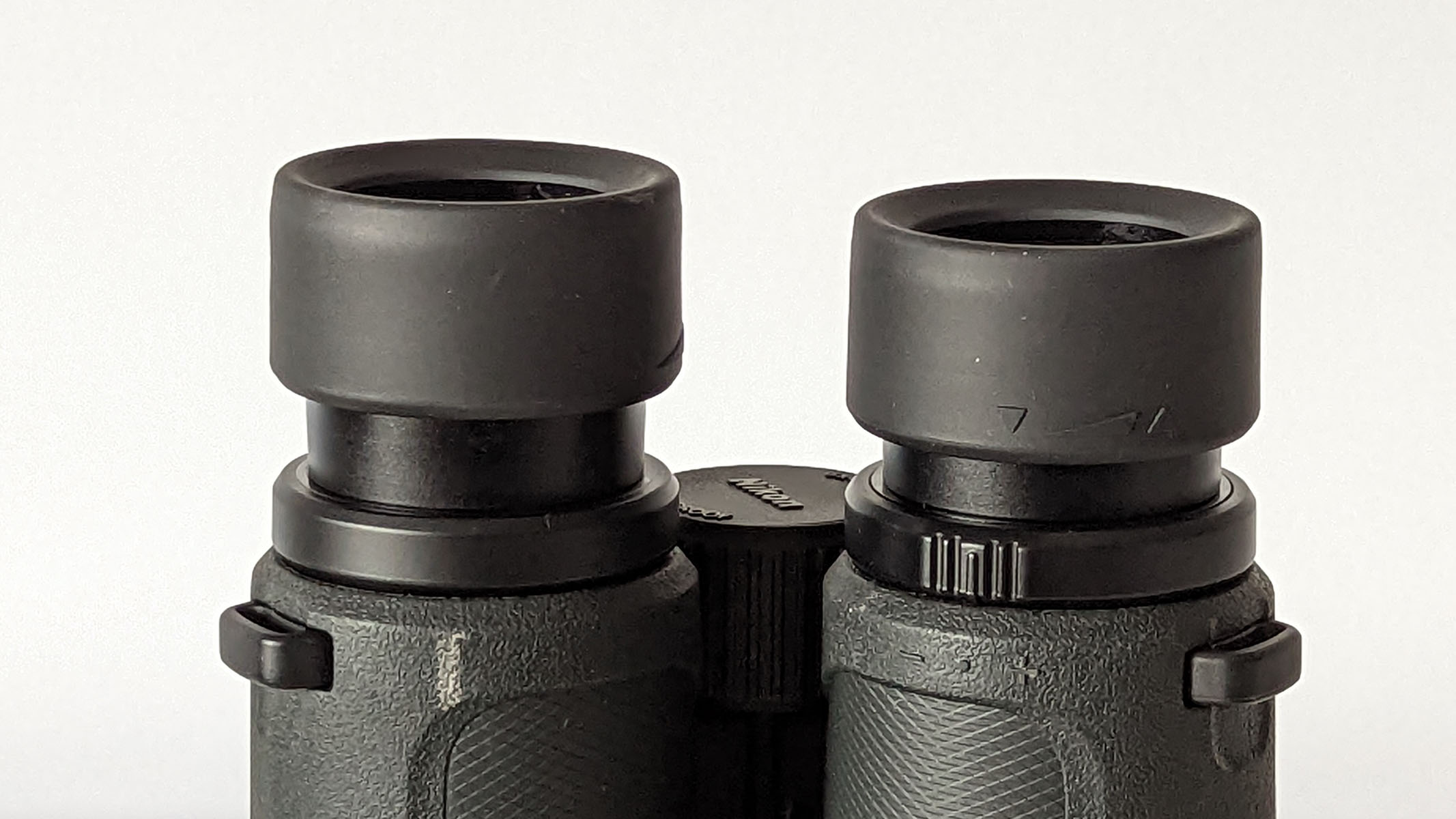
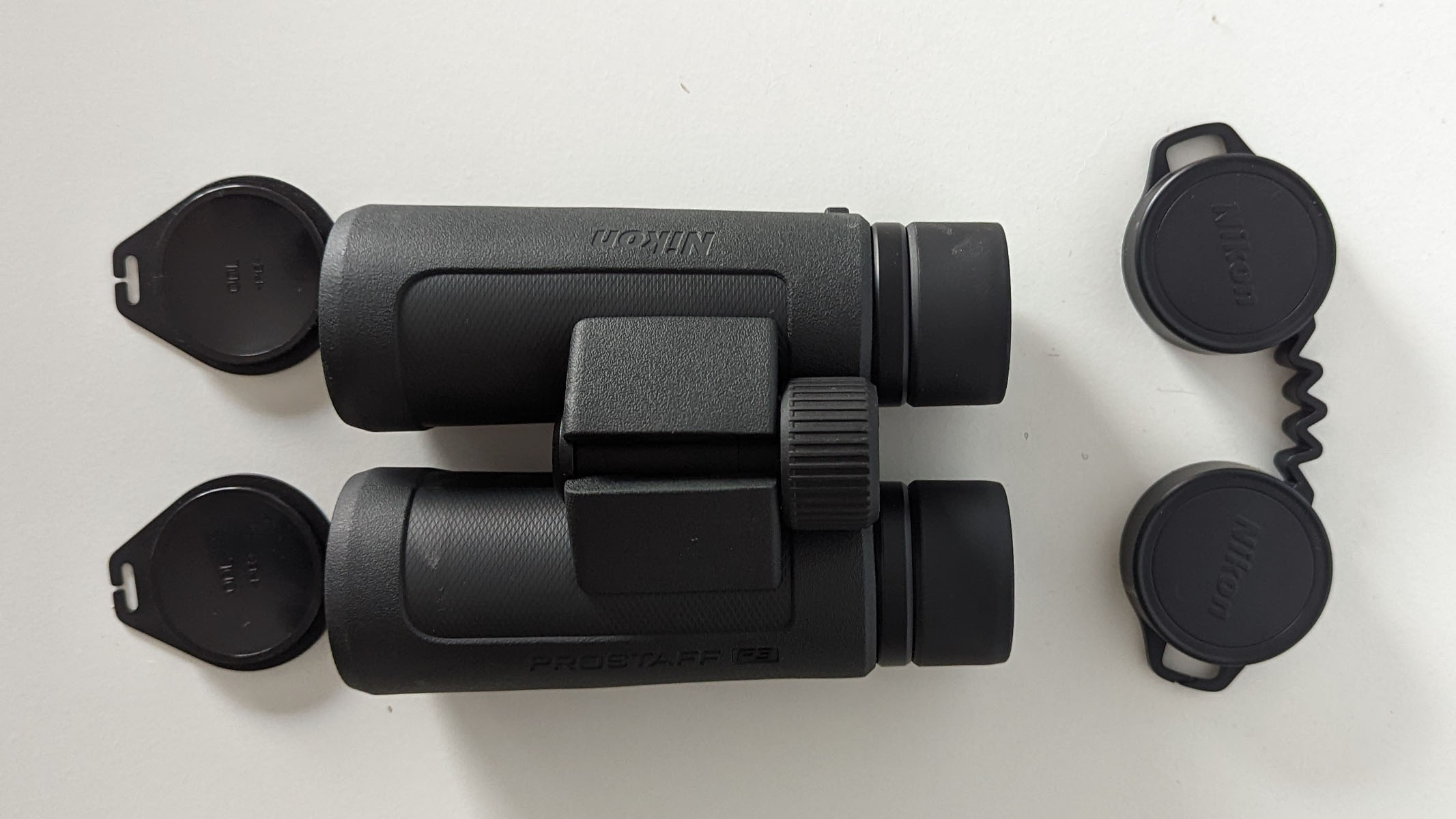
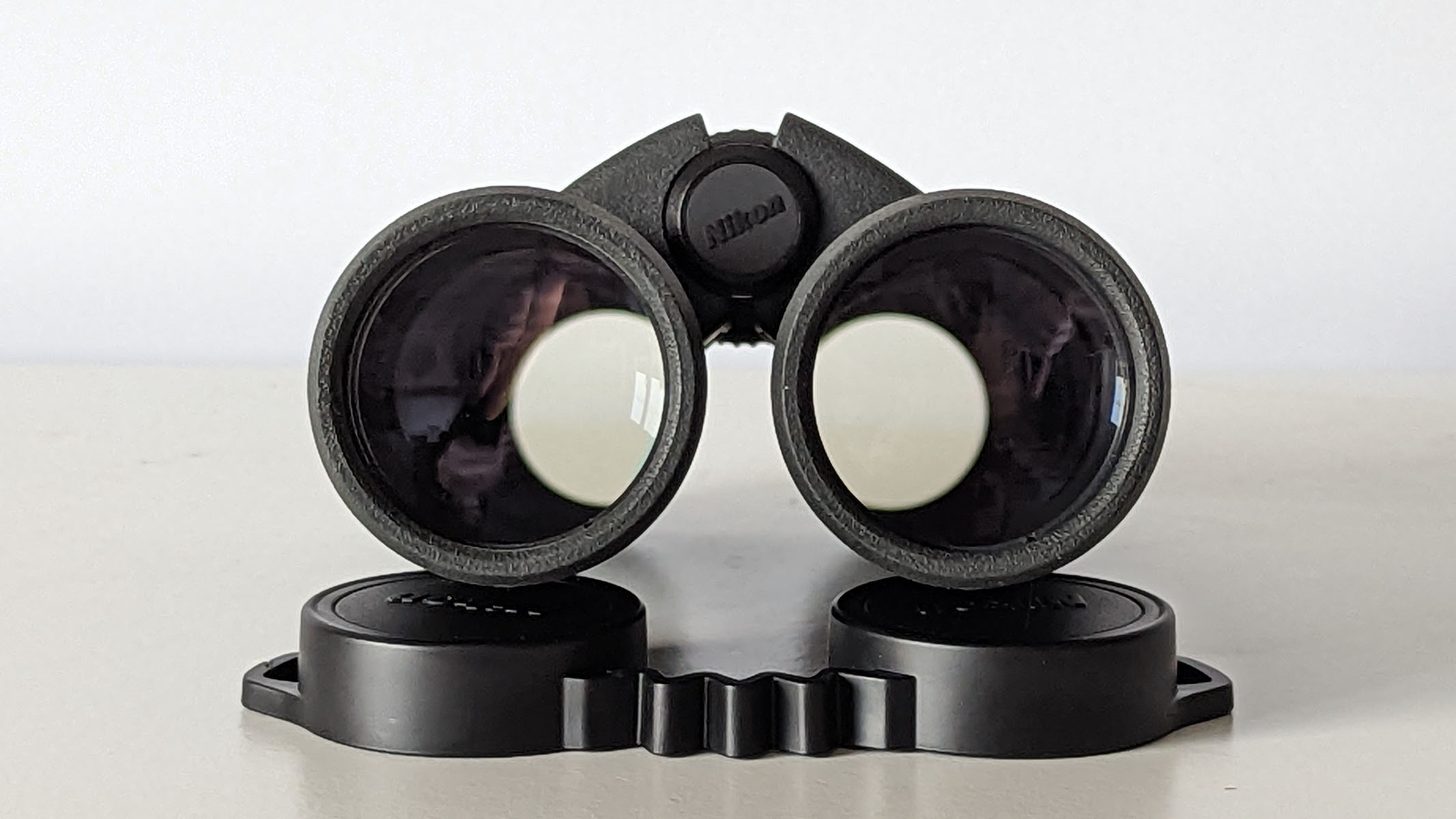
Nikon Prostaff P3 8x42
Our expert review:
Specifications
Reasons to buy
Reasons to avoid
✅ You are looking for a pair of 'go anywhere' binoculars: These binos are kid-friendly but also a great quality pair for adults.
✅ Durability is a must: Not only are they guaranteed to be fog and waterproof, but they also feature a shockproof rubber coating. Great for slippery hands.
❌ You don't want to spend too much: Though they are good value for money, they are still usually between $110 and $150 which is one of the more expensive models on this list.
🔎 Nikon Prostaff P3 8x42: Reasonably priced and easy to use, the Nikon Prostaff P3 8x42 binocular is suitable for beginners and hobbyists alike who want bright, sharp optics in a compact device. ★★★★
If you're looking for a pair of binoculars that you and your kids can both enjoy using, the Nikon Prostaff P3 8x42 could fit the bill. They offer a premium feel in the hand, despite being an entry level, as well as excellent optics to go with it — enough to please all the family.
In our Nikon Prostaff P3 8x42 review we were very impressed by the optics on these binoculars. They come with multi-coated BaK-4 glass and the prisms are coated in silver alloy to keep the views bright, making them great for low-light observations.
The non-slip rubber coating makes them easy to grip, but don't panic if small hands to let them slip into water. They're fully waterproof at up to one meter for up to ten minutes, which should give you enough time to fish them out again. The optics are also nitrogen-purged to ensure your lenses don't fog up when you switch between warm and cold environments.
The roof prism design on these binoculars means that they're slim and lightweight, making them ideal for kids' smaller hands, or for carrying around with you on hikes. The resin chassis is reinforced with fiberglass and covered in rubberized armor, which helps protect the binoculars from knocks and scrapes.
They offer sharp, clear views, with minimal softening around the edges and only slight color fringing. The 42mm objective lenses have enough light-gathering ability for kids to enjoy a spot of stargazing, and the unusually generous 20.2mm eye relief makes them perfect for glasses-wearers as well. They're more expensive than some options on the list, buit we think the quality they offer is worth it, especially if you're looking for a versatile family pair.
- Read our full Nikon Prostaff P3 8x42 review
Attributes | Notes |
|---|---|
Design | Waterproof and fogproof |
Performance | Sharp and bright views |
Functionality | Premium feel in the hand |
Best value for money
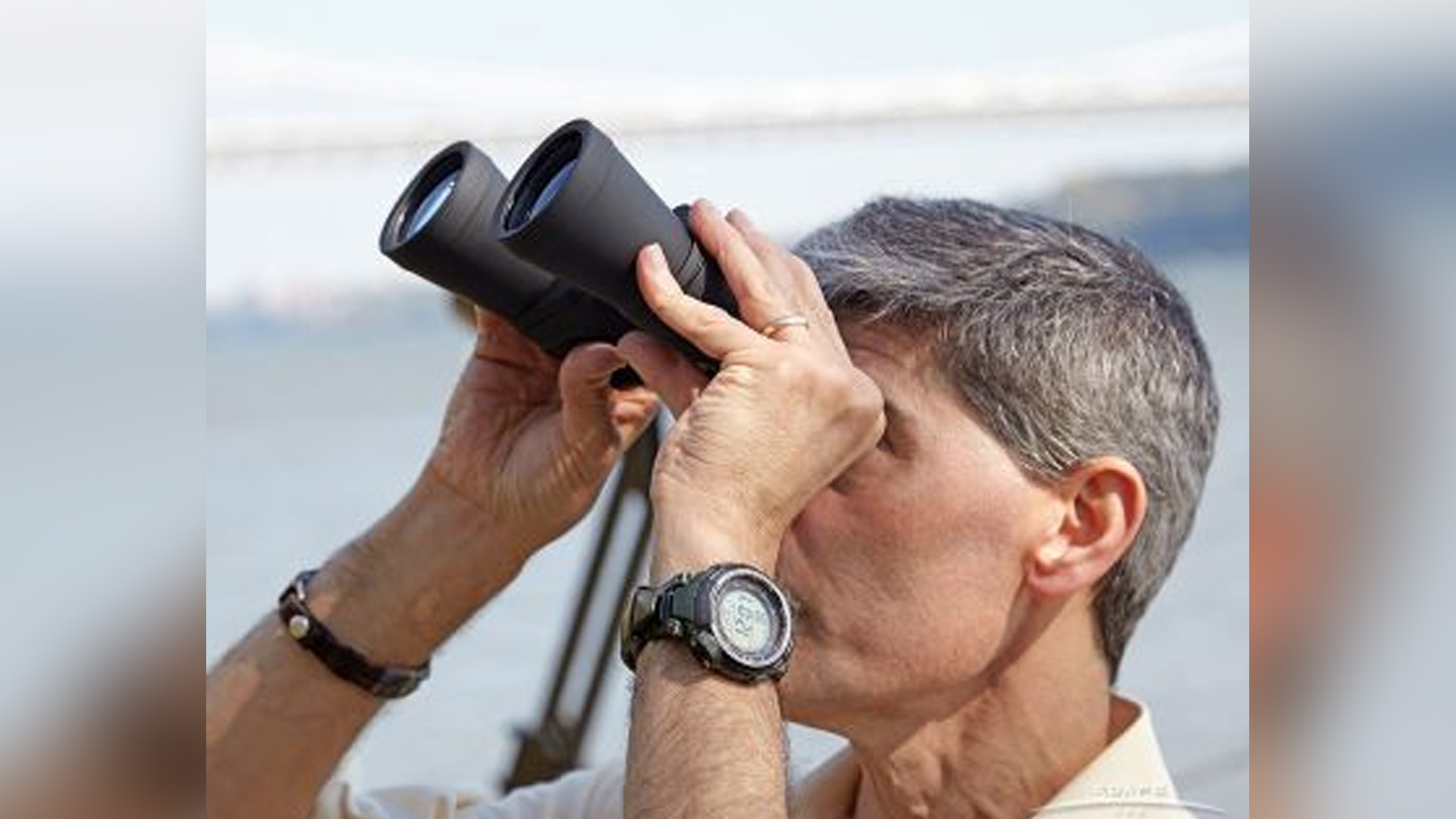
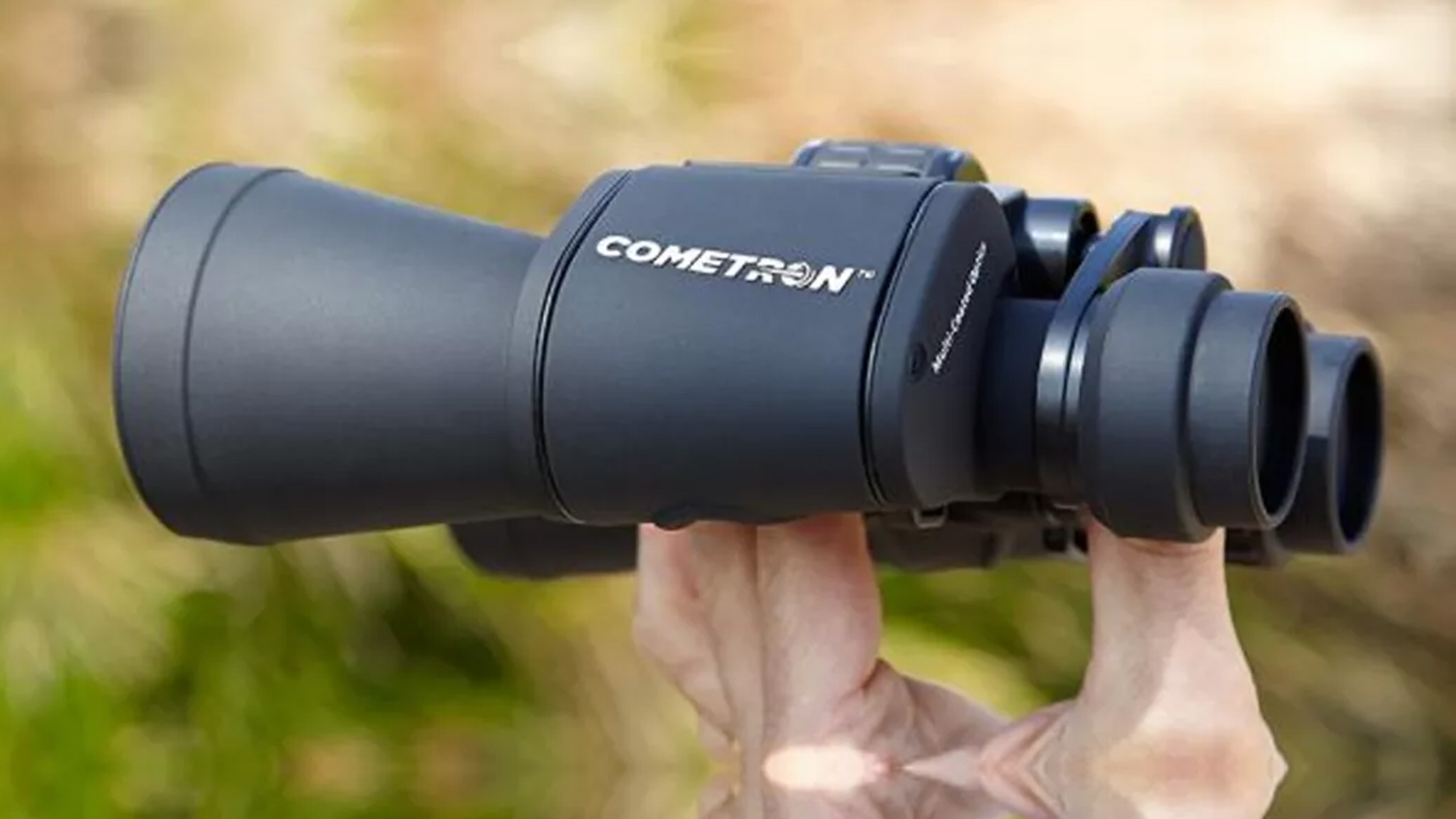
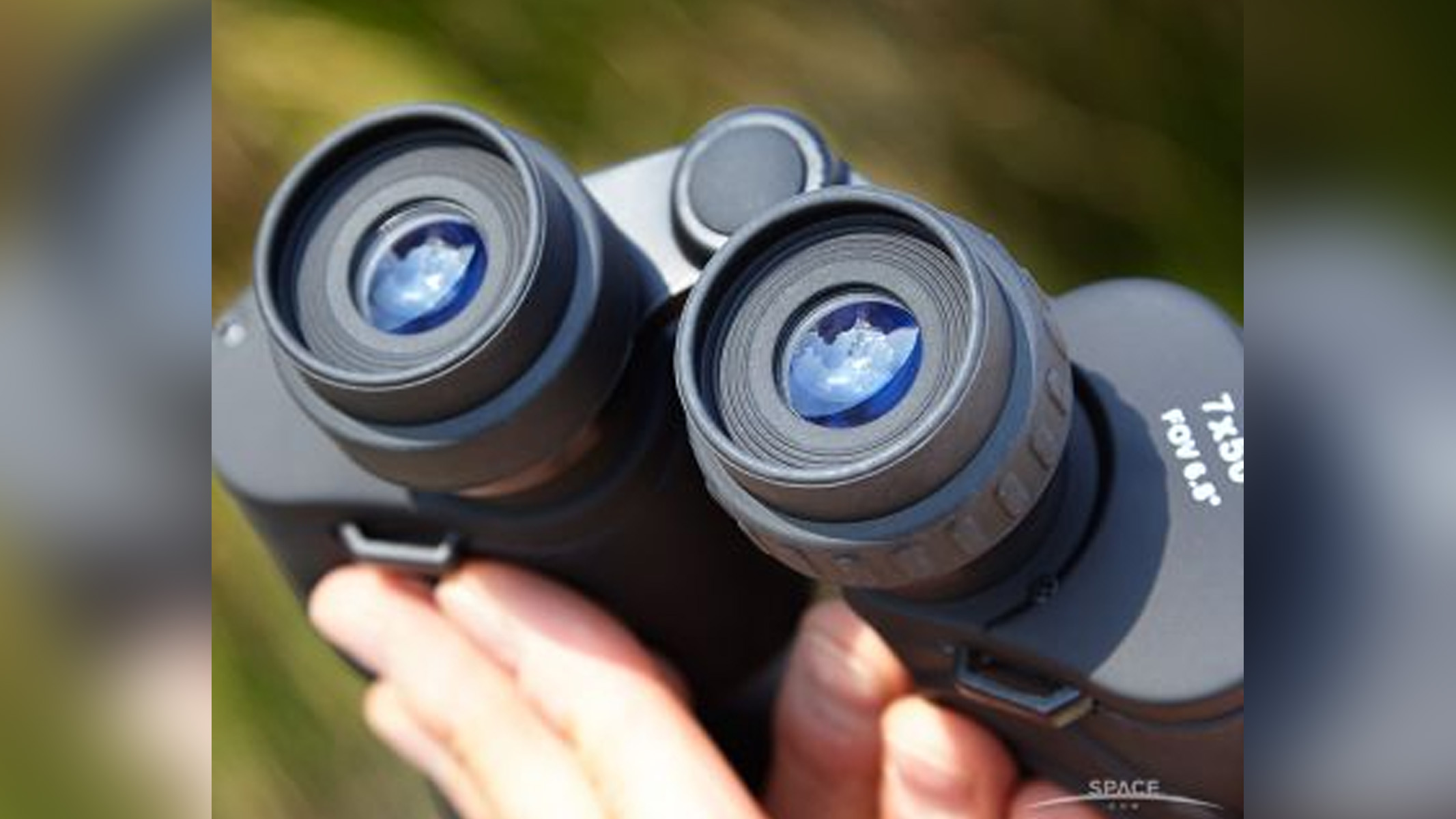
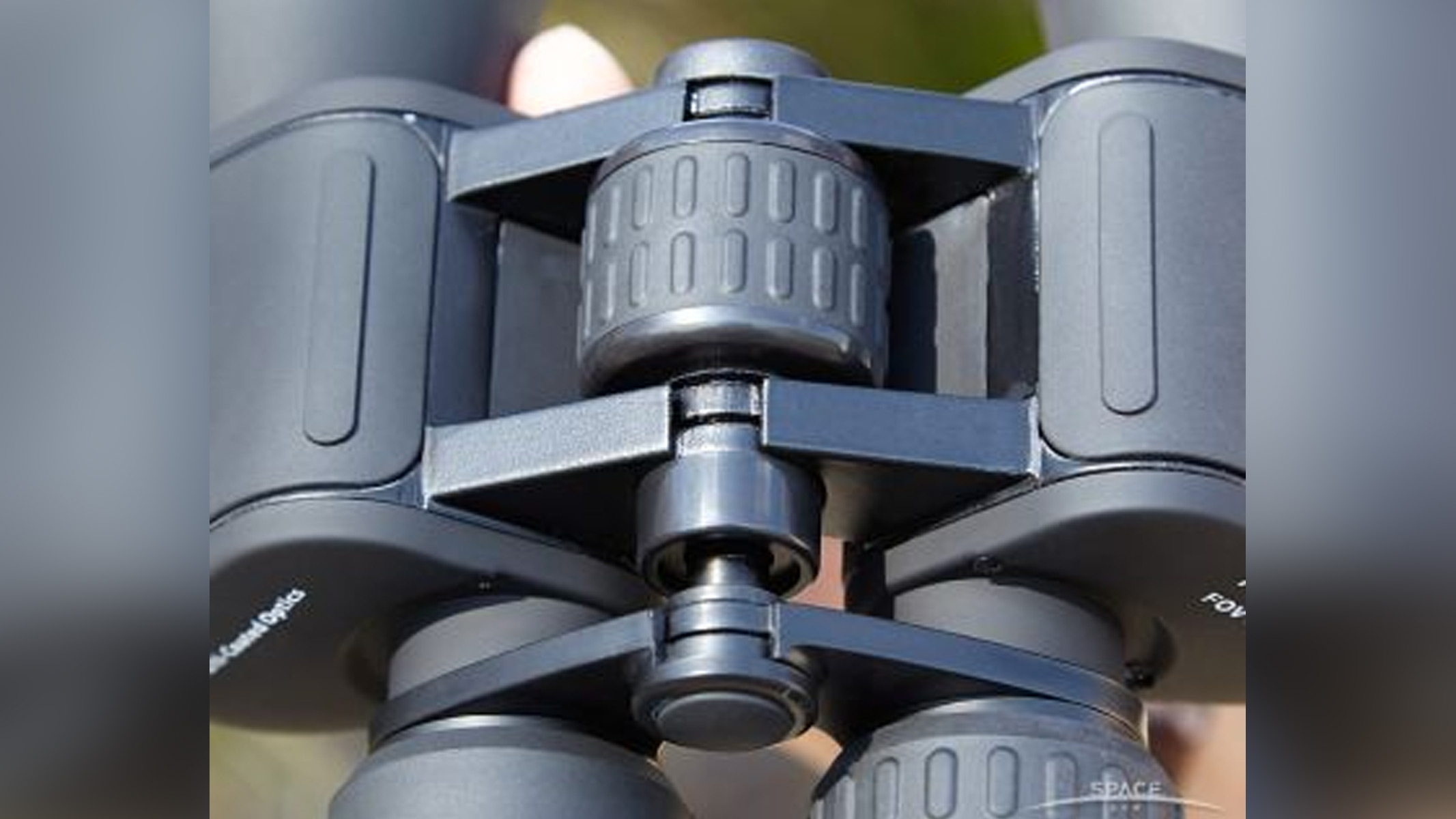
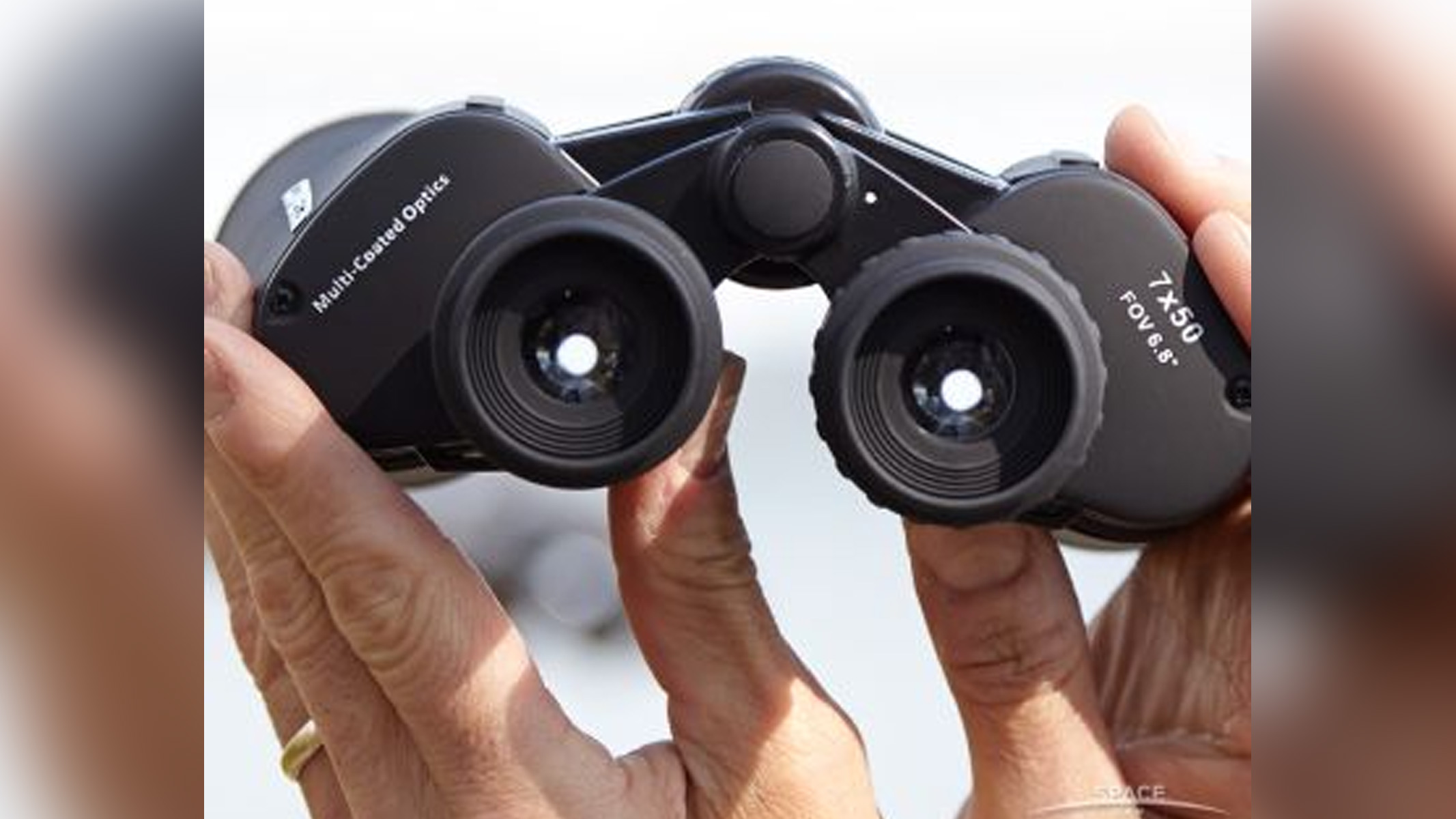
Celestron Cometron 7x50 Binoculars
Our expert review:
Specifications
Reasons to buy
Reasons to avoid
✅ You don't know if the hobby will last: At the time of writing these binos are less than $35; it's a relatively risk-free way of seeing if your child's hobby will last.
✅ You're on a tight budget: For a full-sized pair of binos, you won't find much cheaper than this pair.
❌ Your child wears spectacles: The 13mm eye relief is no good for glasses wearers — they likely won't be able to see the entire field of view.
❌ You want the best quality glass: This pair uses the inferior BK7 glass which means the edges will appear more blurred than if BaK-4 glass was used.
🔎 Celestron Cometron 7x50 Binocular: If you are looking for a very inexpensive entry to the joy of binocular skywatching, you can't do much better than Celestron's Cometron 7x50. ★★★★
The Celestron Cometron 7x50 binoculars are a great choice for kids who might simply be experimenting with a new hobby. If you aren't sure if stargazing or nature-watching is something your child will end up enjoying in the long term, this budget-friendly pair of binoculars is an excellent place to start.
They are a little on the larger side, which may make them slightly unwieldy to use for really small kids, but they're still small enough for most children to enjoy. Their large aperture and 7x magnification mean they're a fantastic introduction to stargazing, and they're capable of letting in a lot of light.
In our Celestron Cometron 7x50 review, we called these binoculars "remarkable value for money". You can typically pick them up for between $40 and $55, although we've found them for even less on occasion. You're unlikely to get a pair of binoculars as capable for any less: They're excellent quality, easy to use and great to use in multiple scenarios.
It also helps that the optics in the Celestron Cometron 7x50 binoculars are great considering their price point. You're getting multi-coated optics and a stargazing-focused Porro prism. Their exit pupil is larger than normal, too, which guarantees maximum light at night and in low-light conditions.
However, there are a few drawbacks to keep in mind—though these are to be expected given the budget price we're dealing with here. It's worth noting that the Celestron Cometron 7x50s use BK7 glass rather than BaK-4, which is less favorable. And despite being listed as water-resistant, remember that's not the same as waterproof, so you won't be able to use these in heavy downpours.
Keep those things in mind, though, and you can have a pair of binoculars that offer truly excellent value for money.
- Read our full Celestron Cometron 7x50 review
Attributes | Notes |
|---|---|
Design | Water-resistant (not waterproof) |
Performance | Useful for other subjects in the daytime |
Functionality | Wide FOV |
Best lightweight option
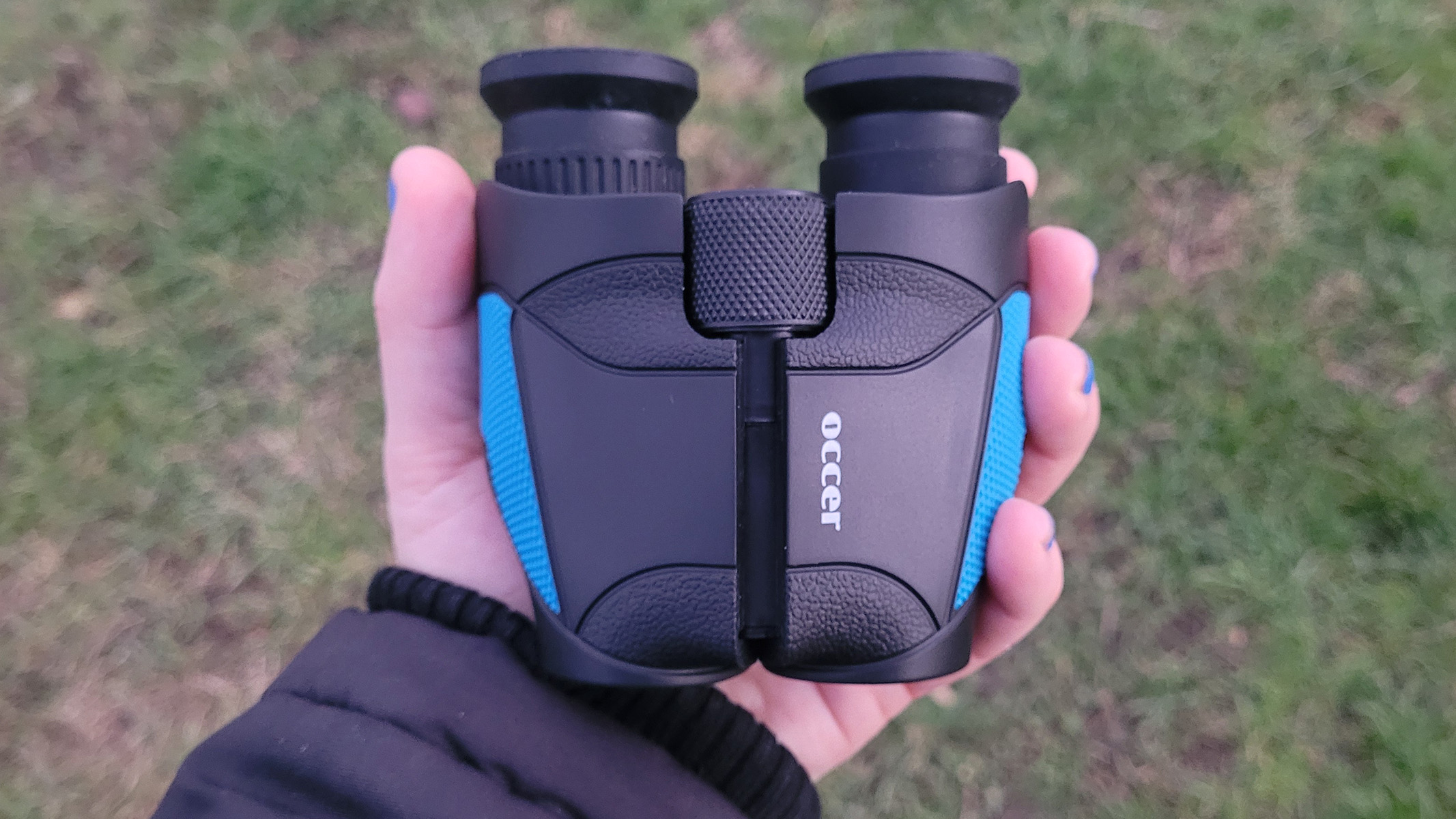
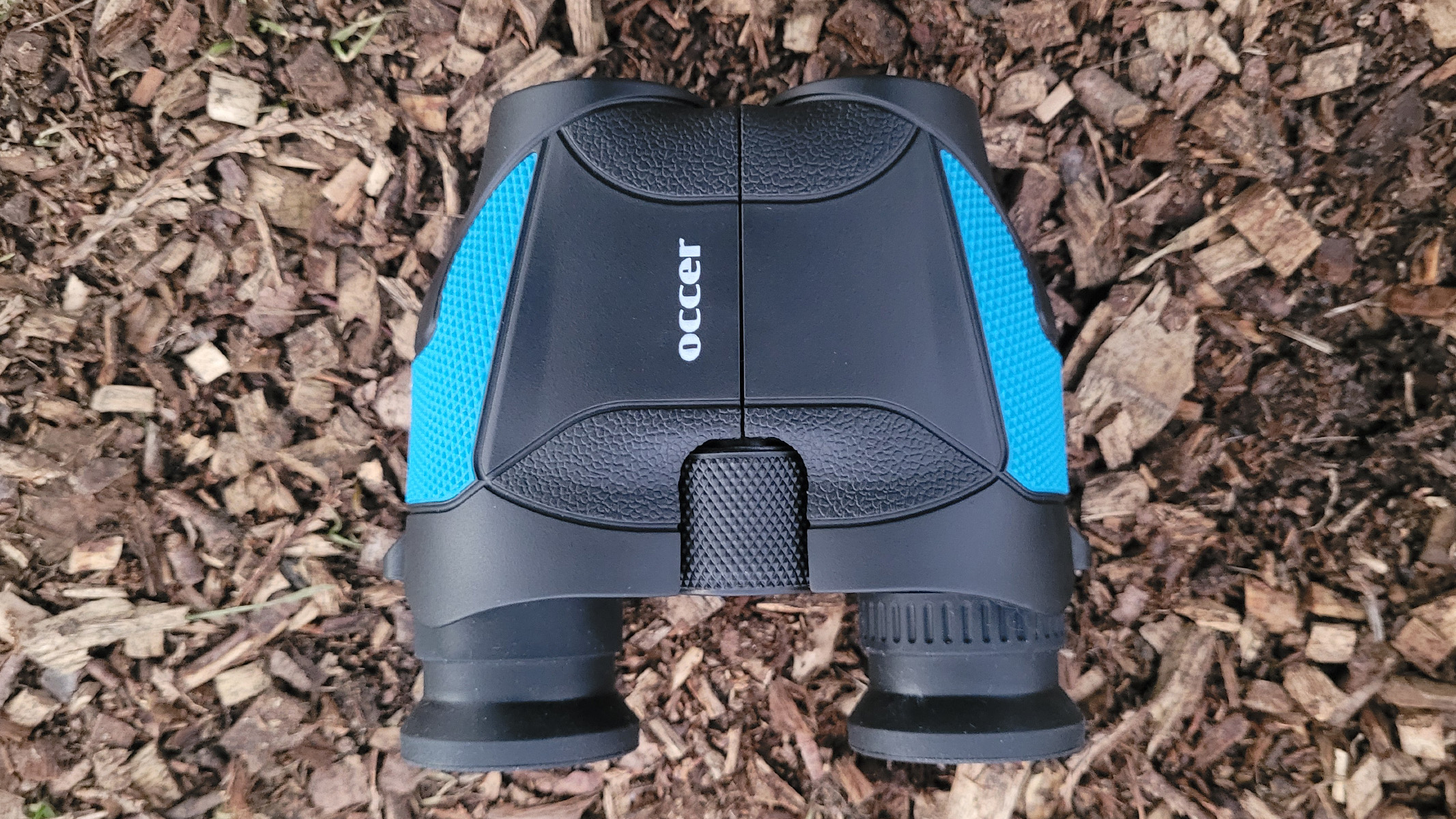
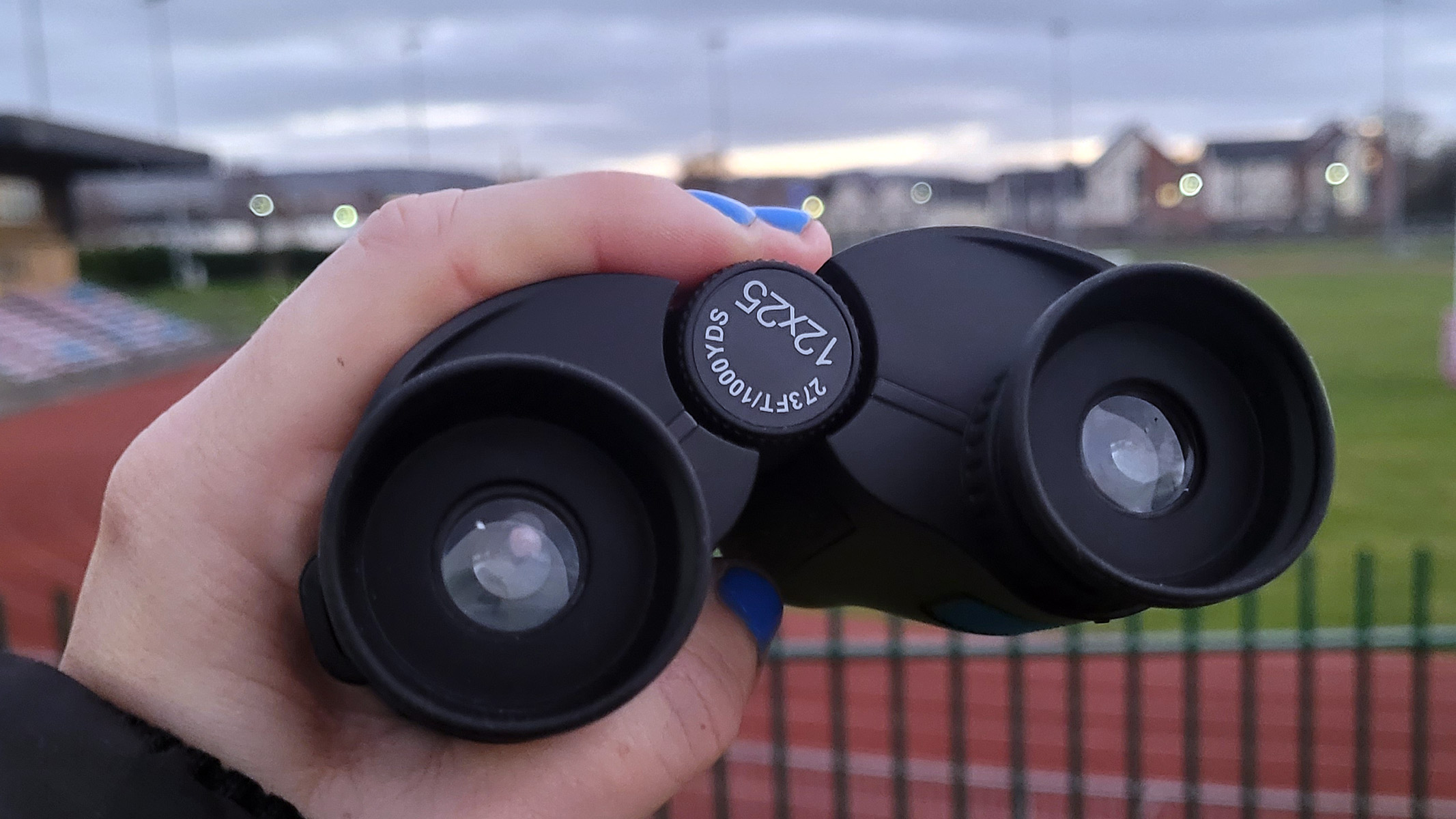
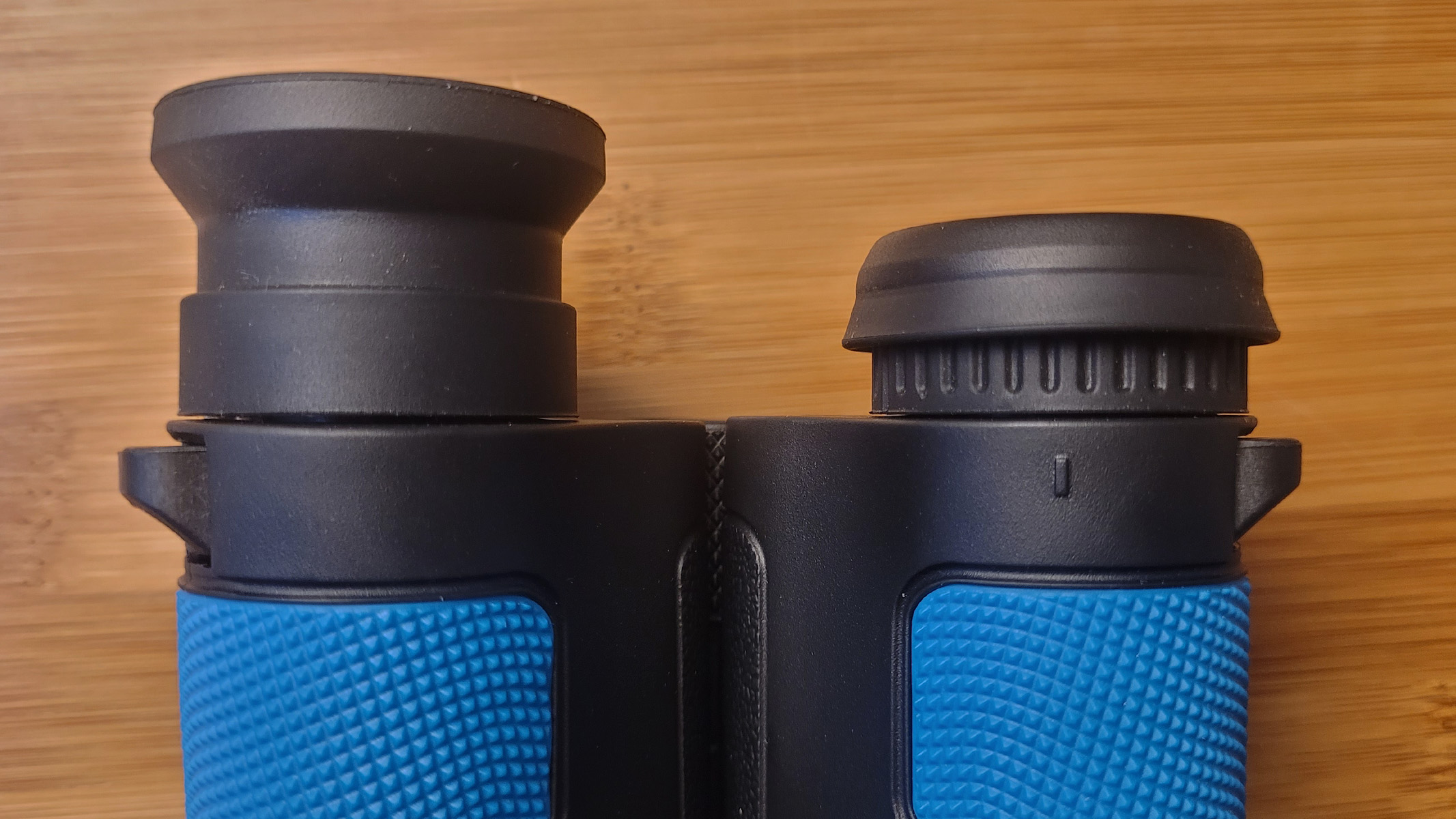
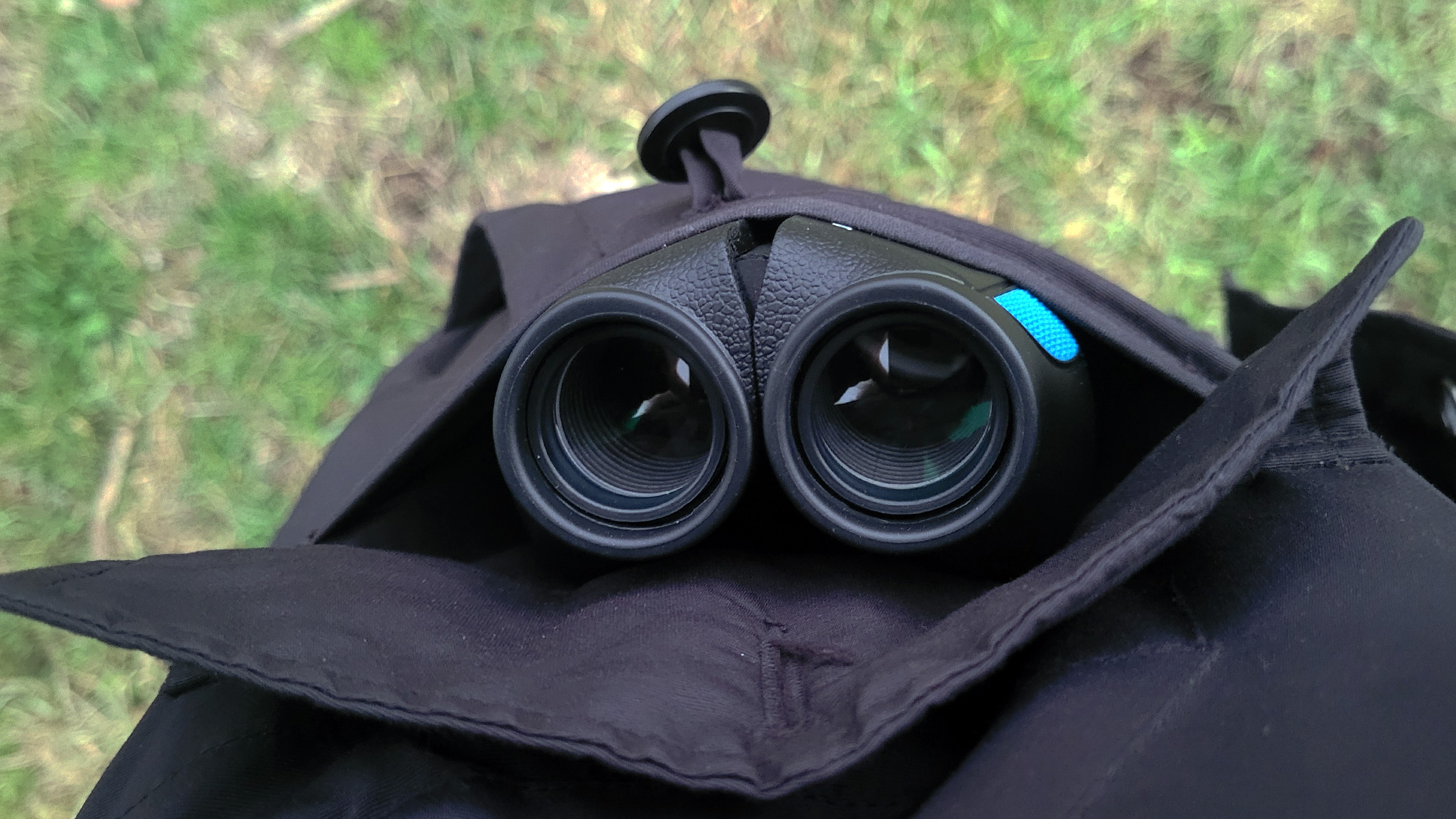
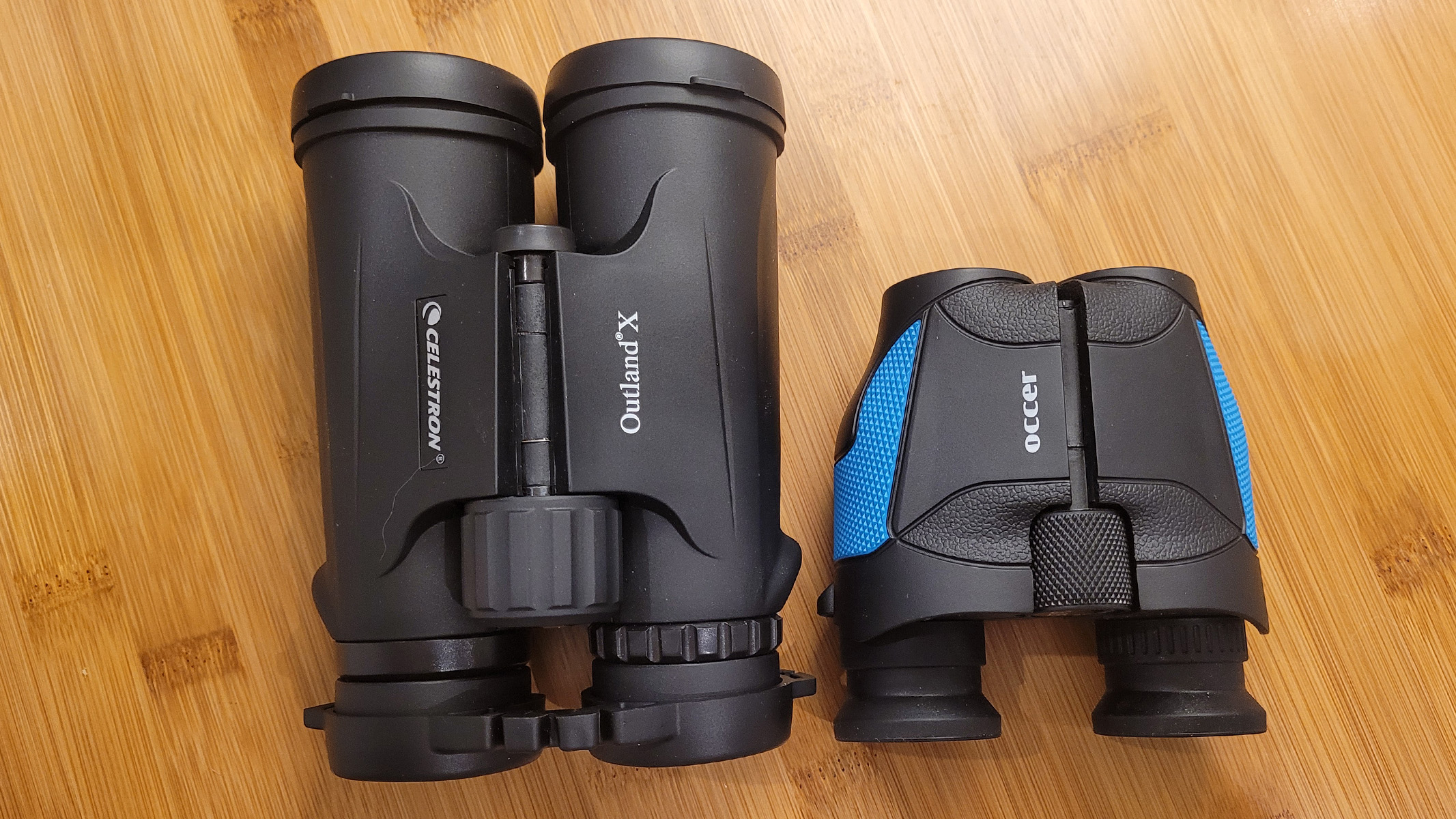
Occer 12x25 compact binoculars
Our expert review:
Specifications
Reasons to buy
Reasons to avoid
✅ You want a pocketable pair: They weigh just 8.8 oz / 249g and fit nicely in the palm of your hand. Not only are they great for kids, but they double up as a good second pair when you don't want to take a large pair with you.
❌ You need something waterproof: These are fair-weather binoculars; they would probably be fine in a light shower but nothing beyond that.
🔎 Occer 12x25 compact binoculars: Ideal for keeping in your pocket and the perfect size for children and small hands, and surprisingly good quality. ★★★½
If you're looking for one of the best sets of binoculars for kids, look no further than the Occer 12x25. Super lightweight with non-slip rubber and an easy-to-hold grip, these binoculars are great for smaller hands — and they still offer excellent views to boot.
Thanks to foldable rubber eyecups, they're extremely comfortable to use and can be easily adjusted to suit individual preferences. We've also found the Occer 12x25's center focus wheel to be nice and easy to operate, too.
In our Occer 12x25 compact binoculars review, we praised the sharp images thanks to the binoculars' BaK-4 multi-coated lenses. We were also pleasantly surprised by the fact there wasn't much visible chromatic aberration (i.e. color fringing), which is always a bonus.
Their compact size makes the Occer 12x25 binos ideal for children, although we've found them to be a great option for adults who want something pocketable while they're out walking, for example. If you're looking for something you and your child can enjoy together, then, this may be a suitable pair.
This is a compact and tough set of binoculars, and so even without a case, we'd be confident in slipping them into a pocket. They do come with a neck strap, though, which we'd recommend kids use to prevent any accidental drops. They're lightweight enough that they're fine around the neck over long periods, too.
- Read our full Occer 12x25 compact binoculars review
Attributes | Notes |
|---|---|
Design | Lots of texture for good grip |
Performance | Bright and colorful views |
Functionality | Wide FOV |
Best for young kids
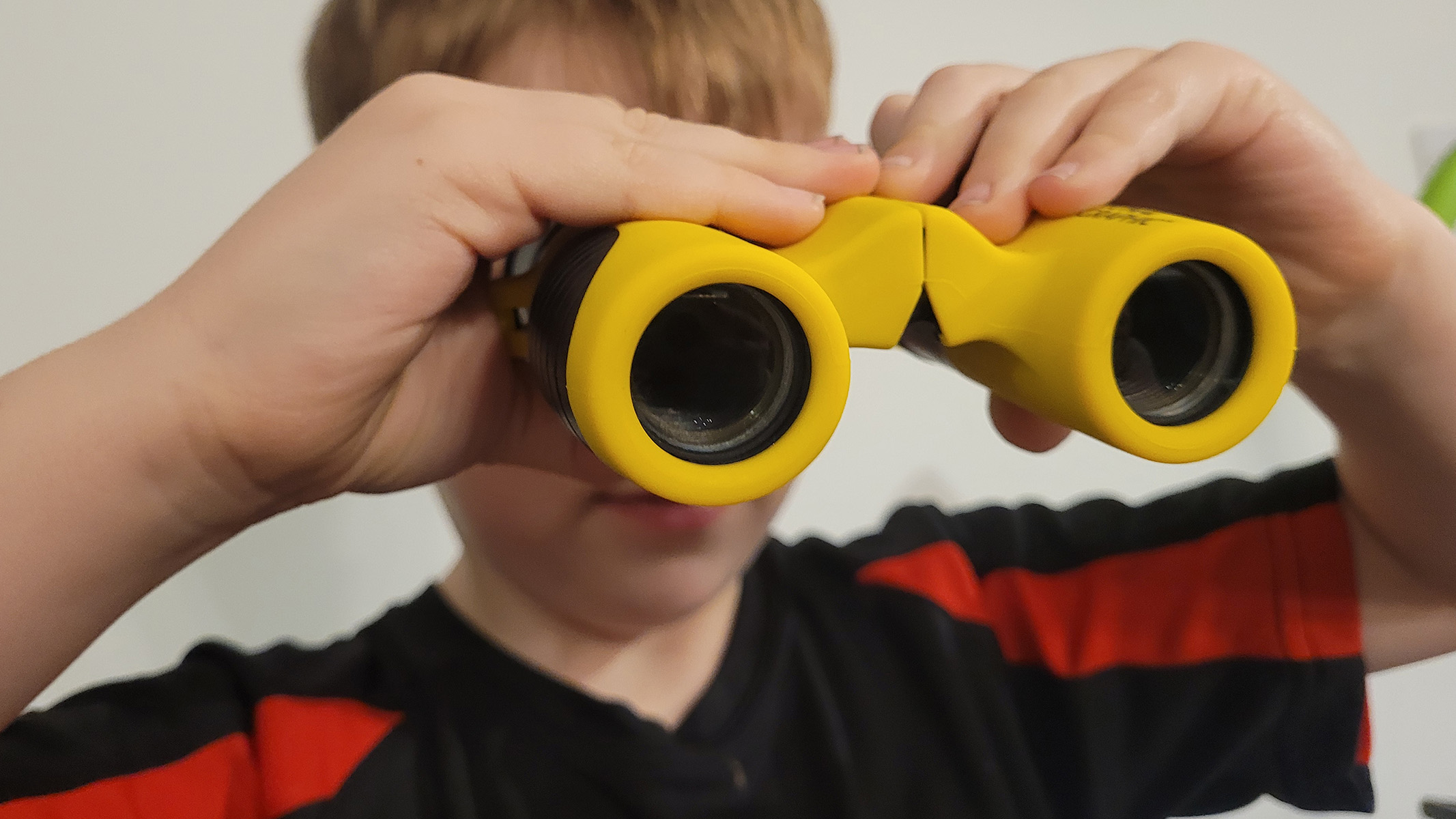
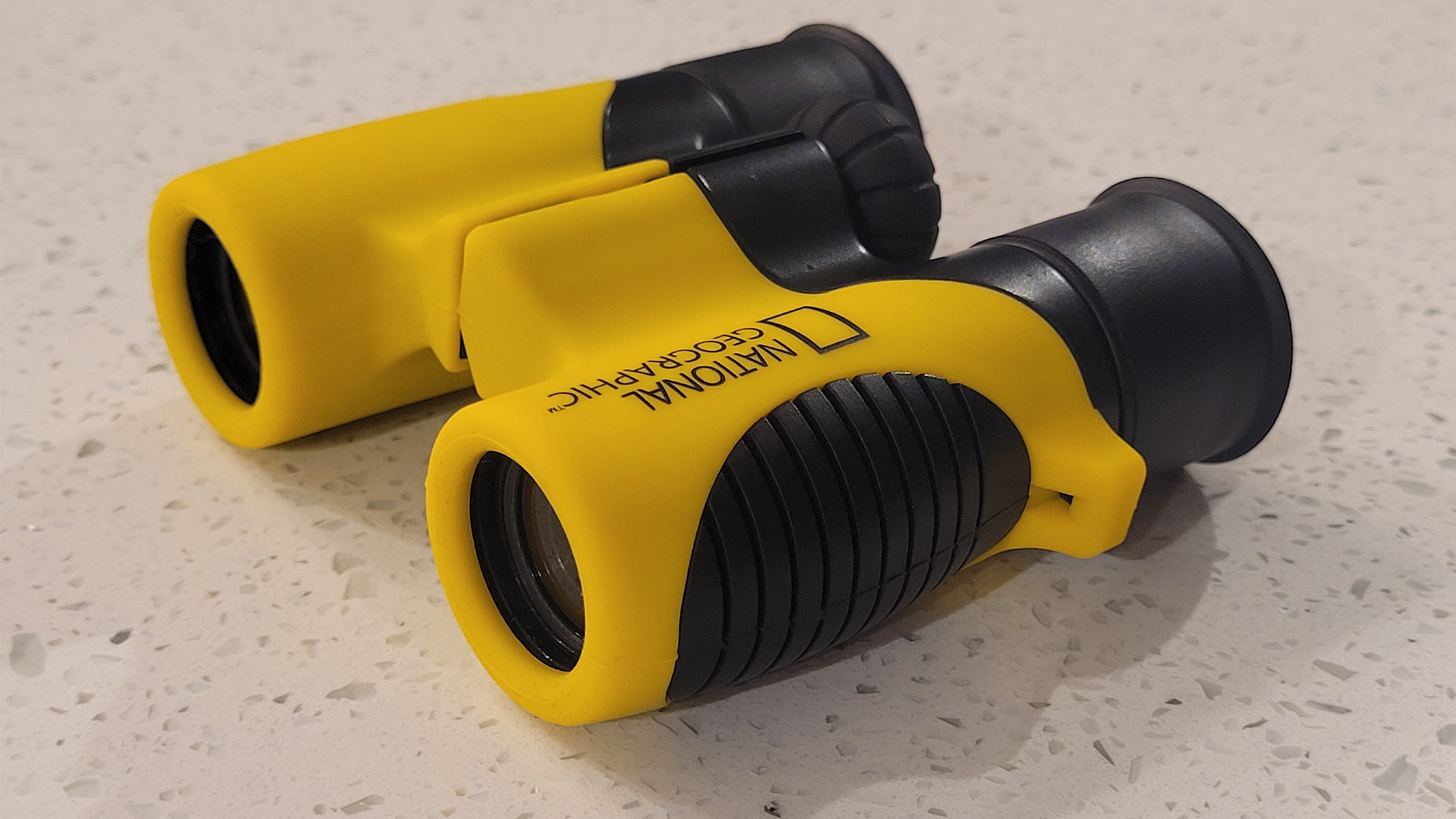
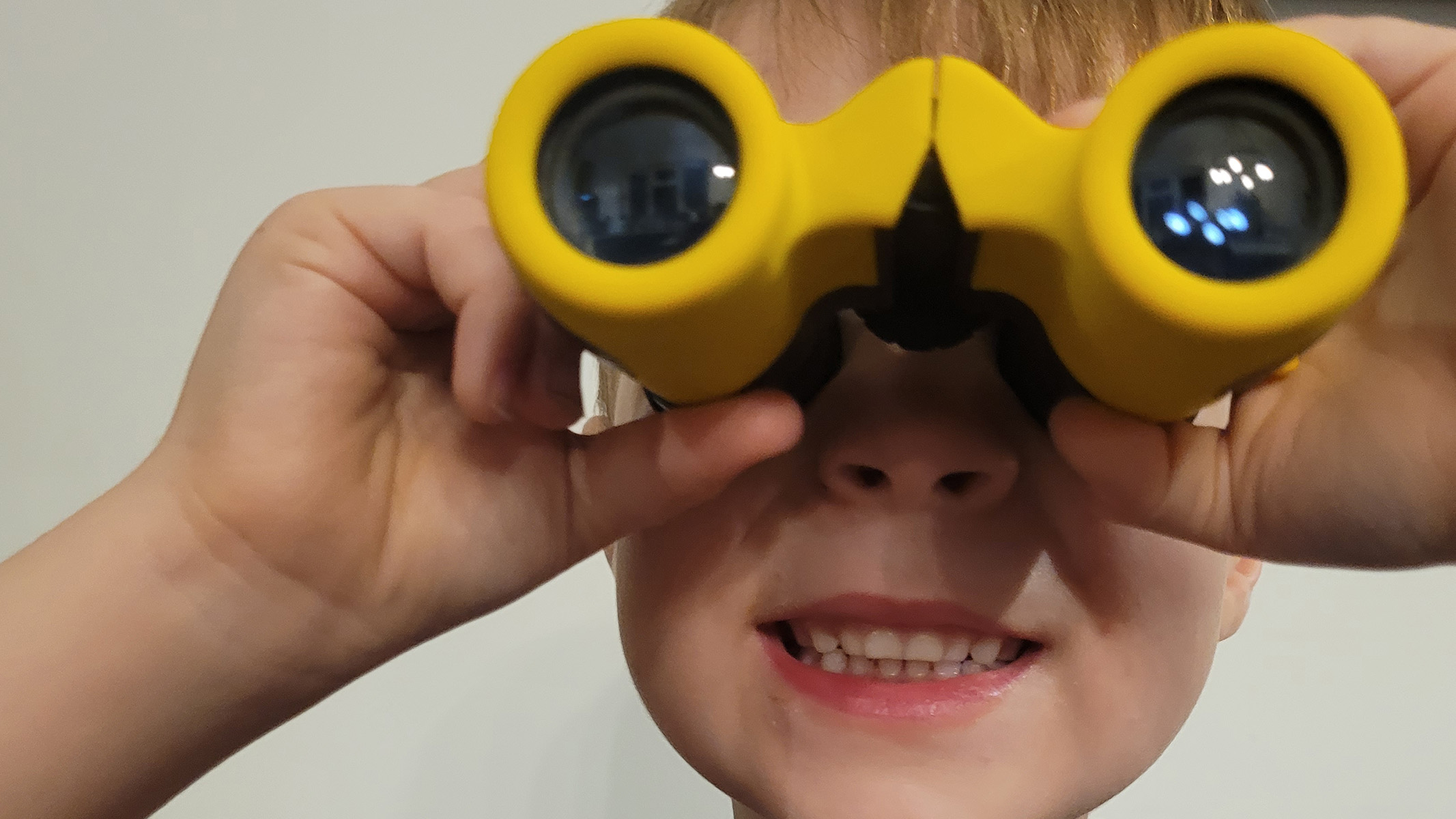
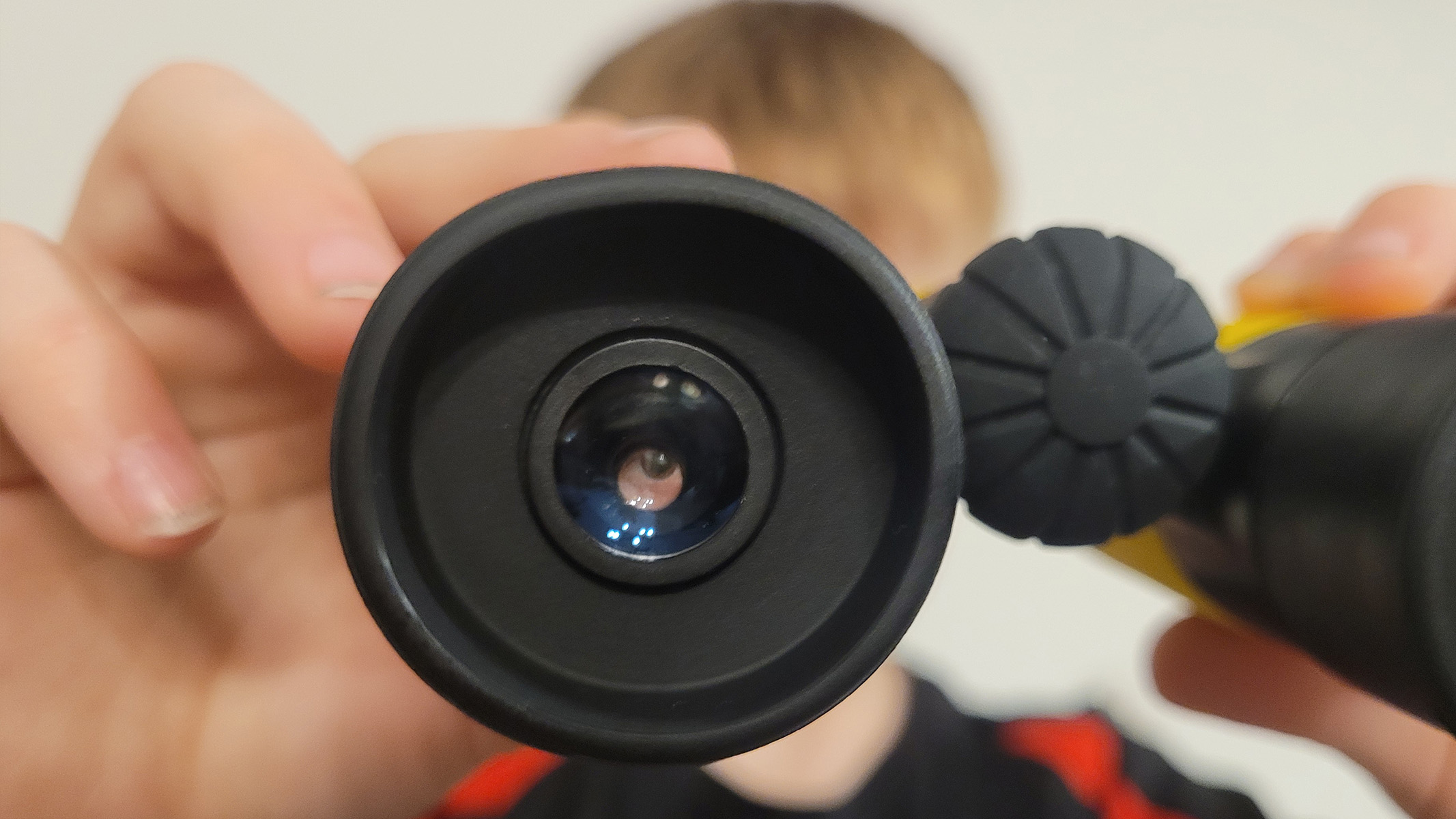
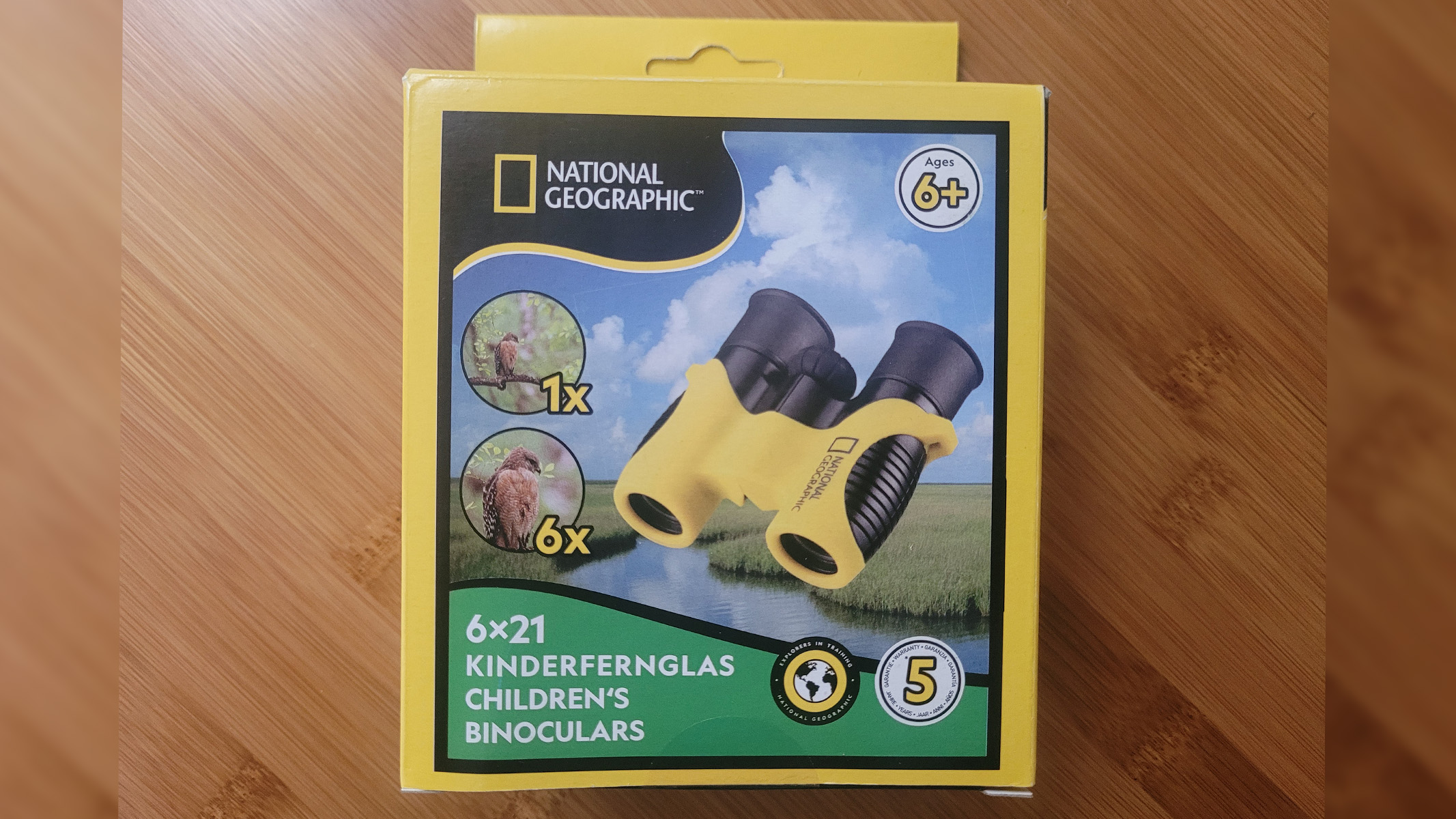
National Geographic 6x21 children's binoculars
Our expert review:
Specifications
Reasons to buy
Reasons to avoid
✅ You are buying for a young child: The bright colors and rugged design, as well as being reasonably priced make these a great pair of first binoculars.
❌ You're buying for an older child: Though young children will love the brightly colored binos, older children would be better off with a more sophisticated pair.
🔎 National Geographic 6x21 children's binoculars: These are a big step up from a pair of toy binoculars and they sit at a price point that warrants them being treated with respect, but one that doesn't break the bank. ★★★½
Of all the products we've included in our round-up of the best binoculars for kids, the National Geographic 6x21 binoculars are the only set specifically designed for children. Their bright yellow exterior makes them eye-catching to youngsters, while also acting as a tough outer shell, and they'll be easy to spot if you drop them at night. Their small form makes them easy for little hands to hold, but despite being targeted solely at youngsters, these binos still aren't toys — in fact, we've been surprised at how good they are to use.
In our National Geographic 6x21 Children's binoculars review, we called them 'a big step up' from toy binoculars. We think this pair makes a great starting point for the youngest children who are showing an interest in looking at the night sky or bird-watching. And if their hobby blossoms, a more powerful set can be purchased later.
Like many grown-up binoculars, the National Geographic 6x21 binoculars have a roof prism design and use BK-7 glass, which offers clear, sharp views. However, they don't have the largest magnification in the world, offering only 6x, and their 21mm objective lenses don't have the best light-gathering abilities, meaning deep stargazing is likely out of the question. They're great for looking at the moon after dark, though, and the anti-reflective coating on the lenses makes for lovely, bright images.
For terrestrial viewing, they do the job of magnifying sporting action, birds and other wildlife perfectly adequately for a very young user, even indoors. If you can put up with their shortcomings, these are a great little cost-effective option as an introductory pair of binoculars, ideal for getting young children interested in stargazing and nature spotting. Our young (five-year-old) test subject preferred these over the aforementioned Occer pair purely because they are bright yellow.
Since kids tend to find it harder to stay still than adults do, the smaller amount of magnification can help everything seem more stable. The higher the magnification is, any little wobbles are also magnified. Reduced wobble makes finding and focusing on things like the Moon easier. They lack substantial eye relief, and as we found in our review, the eye cups are poor quality — so we wouldn't recommend them for kids who wear glasses.
These binoculars sport a strong polycarbonate housing that protects them from the odd knock—something we consider a must when shopping for children. They also come with a wrist strap, which should prevent them from being dropped.
- Read our full National Geographic 6x21 Children's Binocular review
Attributes | Notes |
|---|---|
Design | Ergonomic for small hands |
Performance | Acceptable performance considering the price |
Functionality | Not good enough for stargazing |
Best for glasses wearers
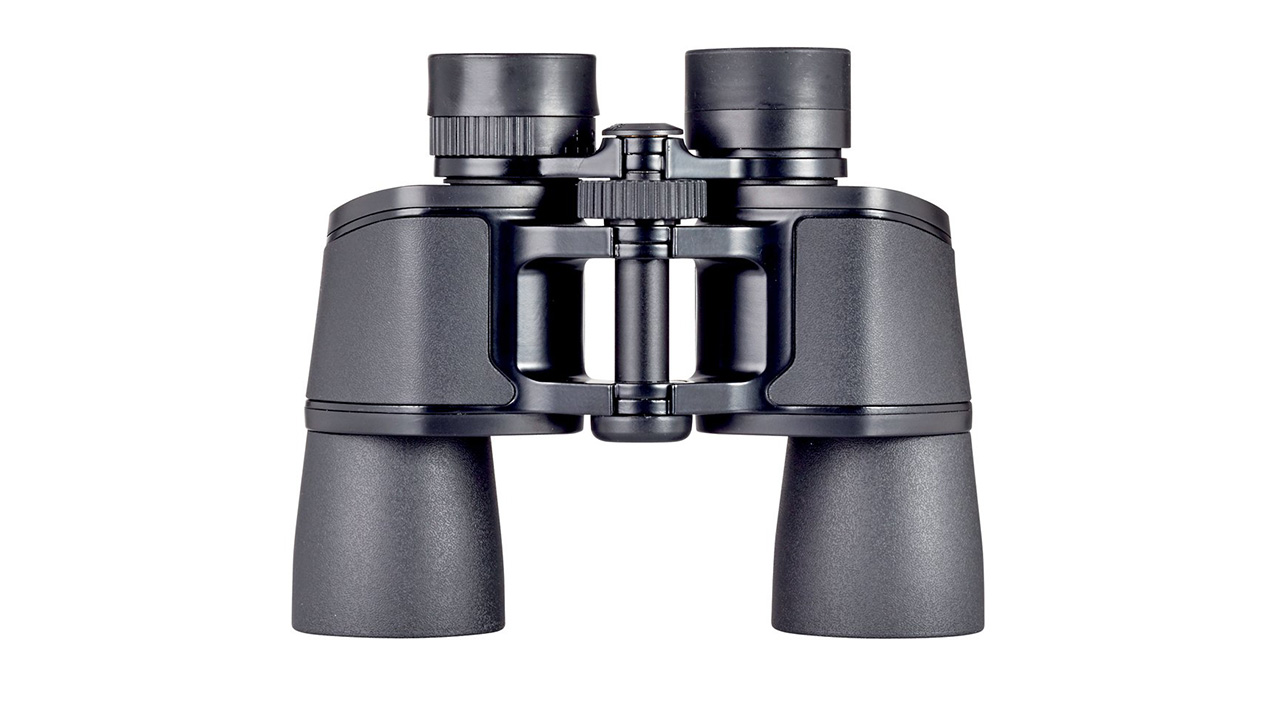
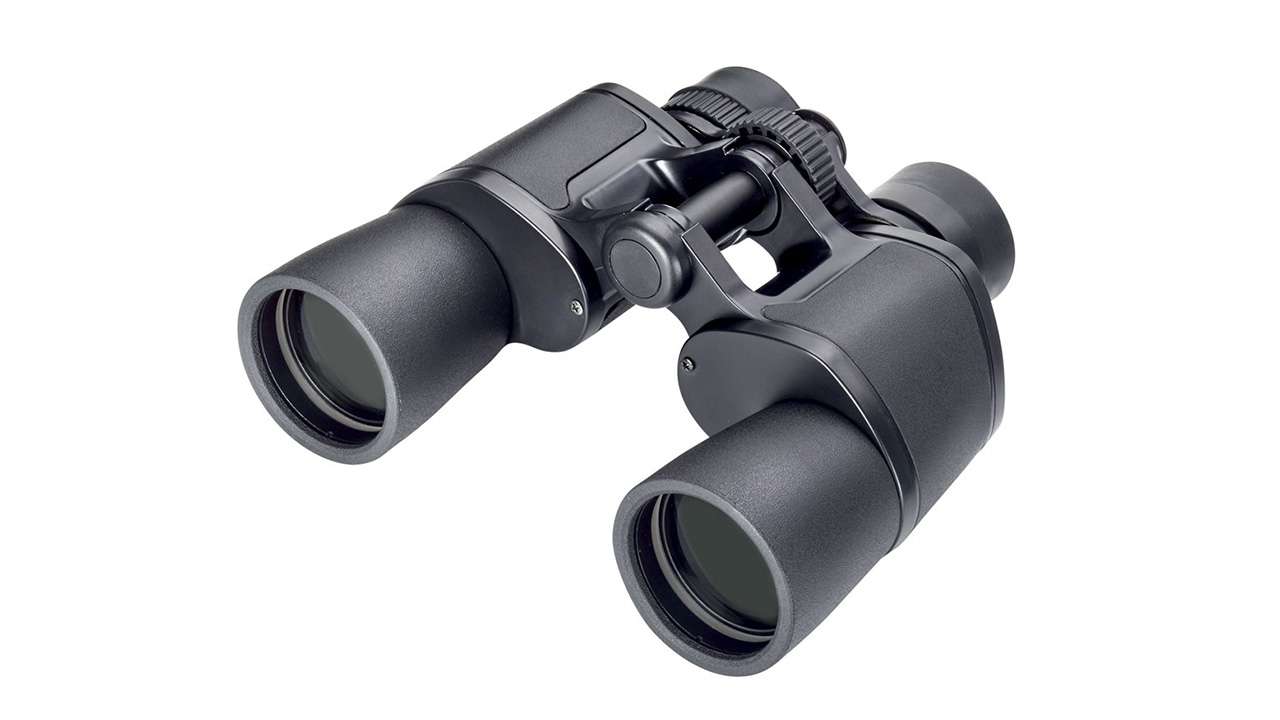
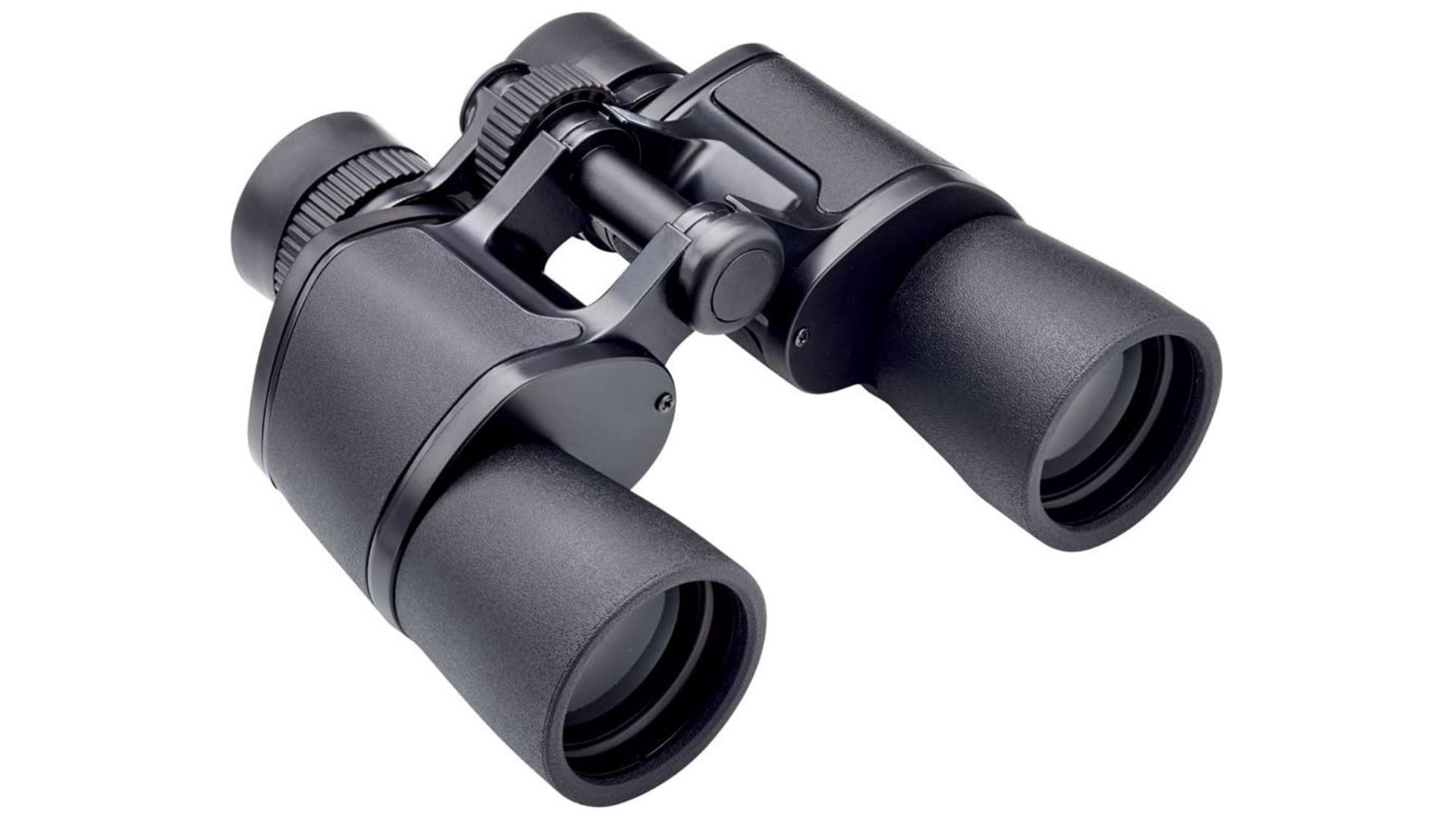
Opticron Adventurer T WP 8x42 Binocular
Our expert review:
Specifications
Reasons to buy
Reasons to avoid
✅ The child wears glasses: These binos have a generous 18mm eye relief, so the young person will be able to see the entire field of view, even when wearing glasses.
✅ You want the best quality glass: These binos utilize top-quality BaK-4 glass that is fully multi-coated.
❌ You're buying for a young child: At 623 grams, these are fairly heavy binoculars that young children may struggle to hold.
🔎Opticron Adventurer T WP 8x42 Binocular: They are good but not great, performing well for astronomy but having little to make them stand out in a competitive field. ★★★
We highly recommend the Opticron Adventurer T WP 8x42 binoculars for children who want to view the night sky. Their 8x magnification with a 42mm objective lens is slightly lower than we'd normally recommend for adults, but it means they're lighter and smaller — perfect for kids. Even better, their long eye relief ensures they're a great choice for those who wear glasses.
These binoculars aren't just useful for viewing the night sky. While we think they're excellent for beginner astronomers, their specifications make them just as good to use during the day, whether it's observing wildlife and landscapes or watching events from a distance.
In our Opticron Adventurer T WP 8x42 review, we consider these an excellent value pair of binos. We praised their high-quality BaK-4 glass, multi-coated lenses and Porro prism design, which offers excellent, bright views. Coupled with a waterproof body and protective armor, these binoculars are ideal for kids. As a bonus, you'll get a soft case, a neck strap and lens covers with the Optiron Adventurer T WP 8x42 in the box, meaning they're protected right from the word go.
You can pick the Opticron Adventurer T WPs up in other specifications, too, including 6.5x32, 8x32, 10x42, 10x50 and 12x50, but we find the 8x42 model to be a good balance between size and power for younger users.
- Read our full Opticron Adventurer T WP 8x42 review
Attributes | Notes |
|---|---|
Design | Tough rubberized coating |
Performance | Poor close focus |
Functionality | Narrow FOV |
Best styling
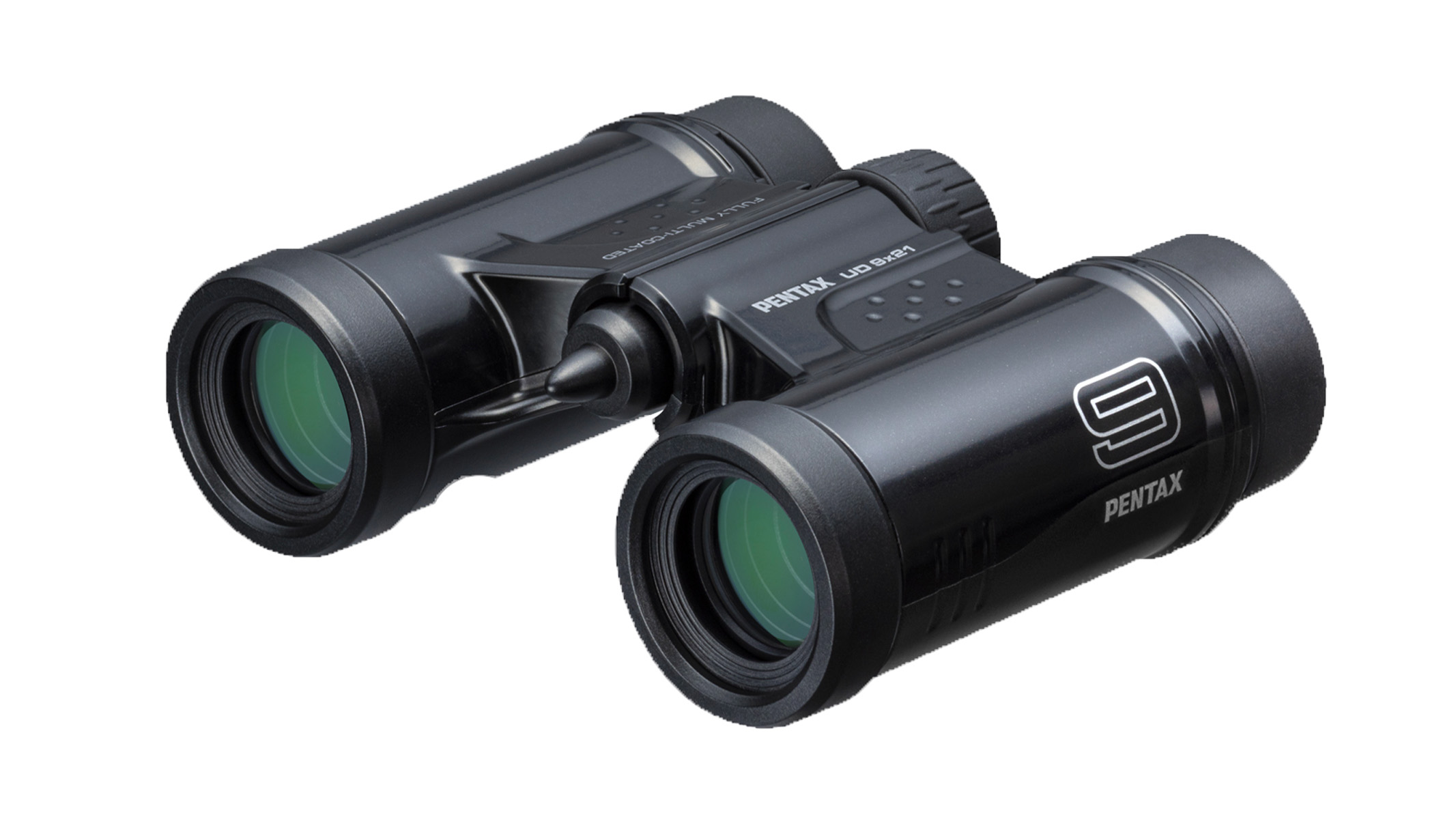
Pentax UD 9x21
Our expert review:
Specifications
Reasons to buy
Reasons to avoid
✅ You want something small: These binos are tiny and lightweight, so will serve you well when traveling.
✅ You want to get your child binoculars in their favorite color: The range of colors available means you can customize your choice to your child's taste.
❌ You want high magnification: While they aren't bad in terms of magnification, there are certainly better options out there if that's what you're after.
🔎Pentax UD 9x21: These compact binoculars come in some bold colors, including orange, lime green and hot pink. They're always easy to spot if dropped, and will likely be more appealing to kids as a result. ★★★½
These binoculars are a fantastic option if you want something lightweight for small hands. To reduce their overall weight, they are crafted with a plastic chassis instead of metal, and instead of rubber armor, they feature two small thumb rests for grip. This design choice results in a weight of only 195g, and with dimensions of 10.8 x 8.7 x 3.8 cm, they're incredibly portable and can easily fit in your pocket.
Considering how lightweight they are, we've been very impressed with how well they handle. They have a large focus wheel which is nice and easy to use, and just two rotations will span the entire range of focus. We should note that despite being compact, these binoculars do come with a tripod mount — but if you want to use it, you'll need to purchase an (inexpensive) adapter. The tripod can be helpful for steadying small hands.
The Pentax UD 9x21 binoculars have a field of view of six degrees. We consider this to be adequate, although it might not give your child the same visual detail as a full-sized pair. There is also a 10x21 version of the Pentax UD, but we think the 9x21 is the better option due to better eye relief and the fact they have multi-coated lenses.
These compact binoculars offer a great middle ground between 8x magnification, which can be easier to hold, and 10x magnification, which offers more detail. The 9x magnification on these binoculars gives users the best of both worlds, and they come with high-quality optics that are fully multi-coated as well.
Attributes | Notes |
|---|---|
Design | Lightweight plastic build with fun colors. |
Performance | Large and accurate focus wheel. |
Functionality | Includes a tripod mount. |
Best for young teens
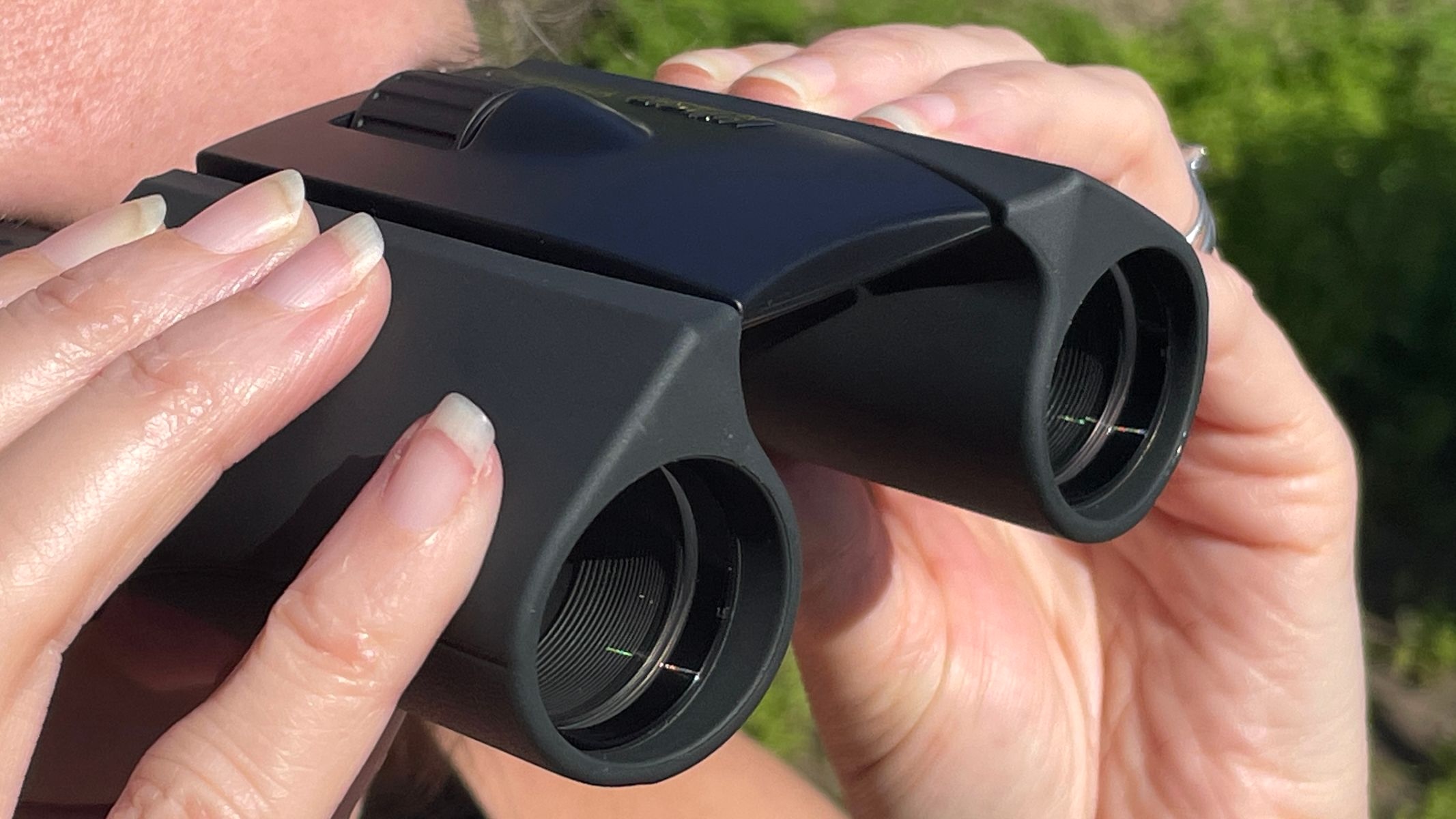
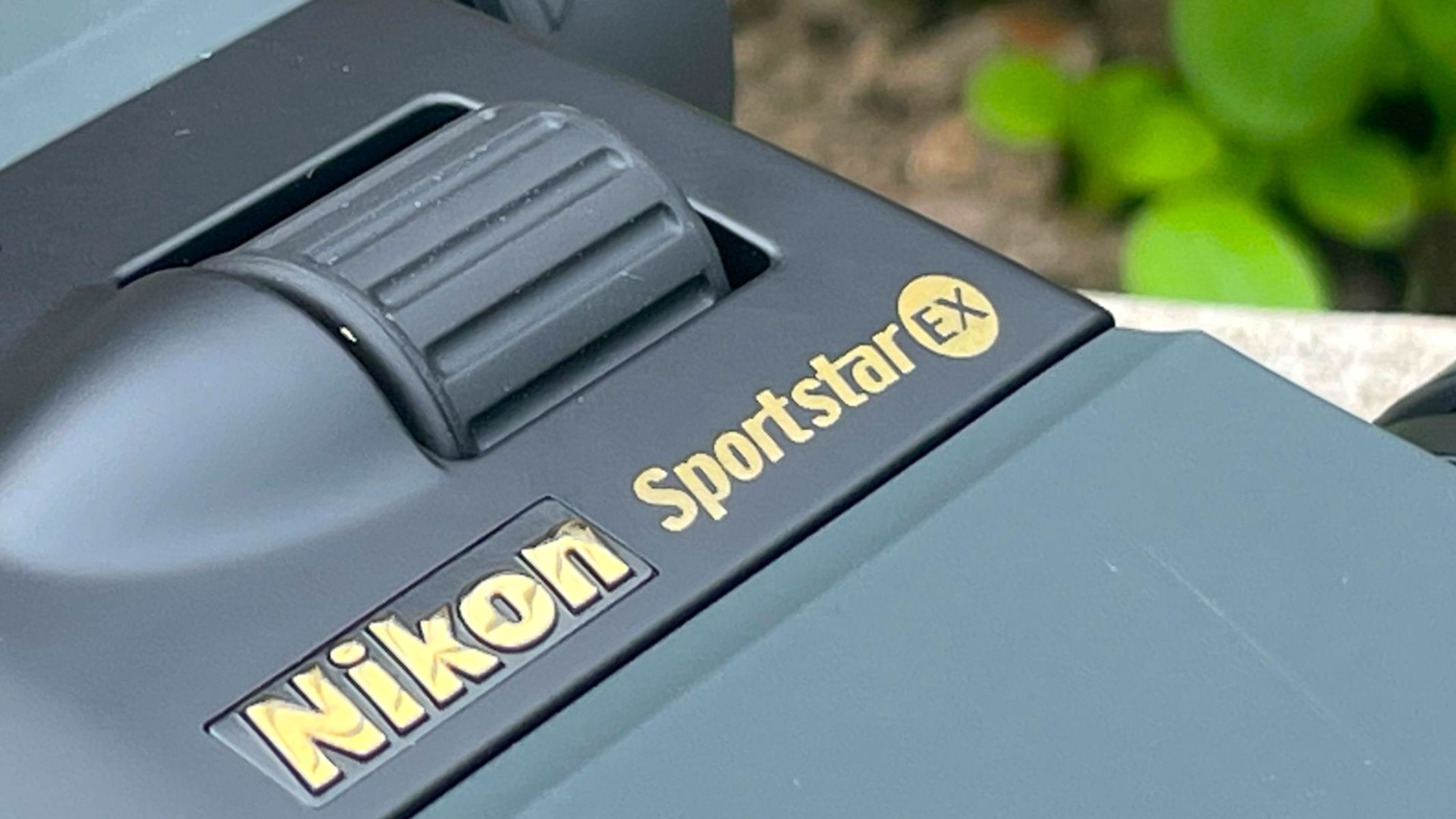
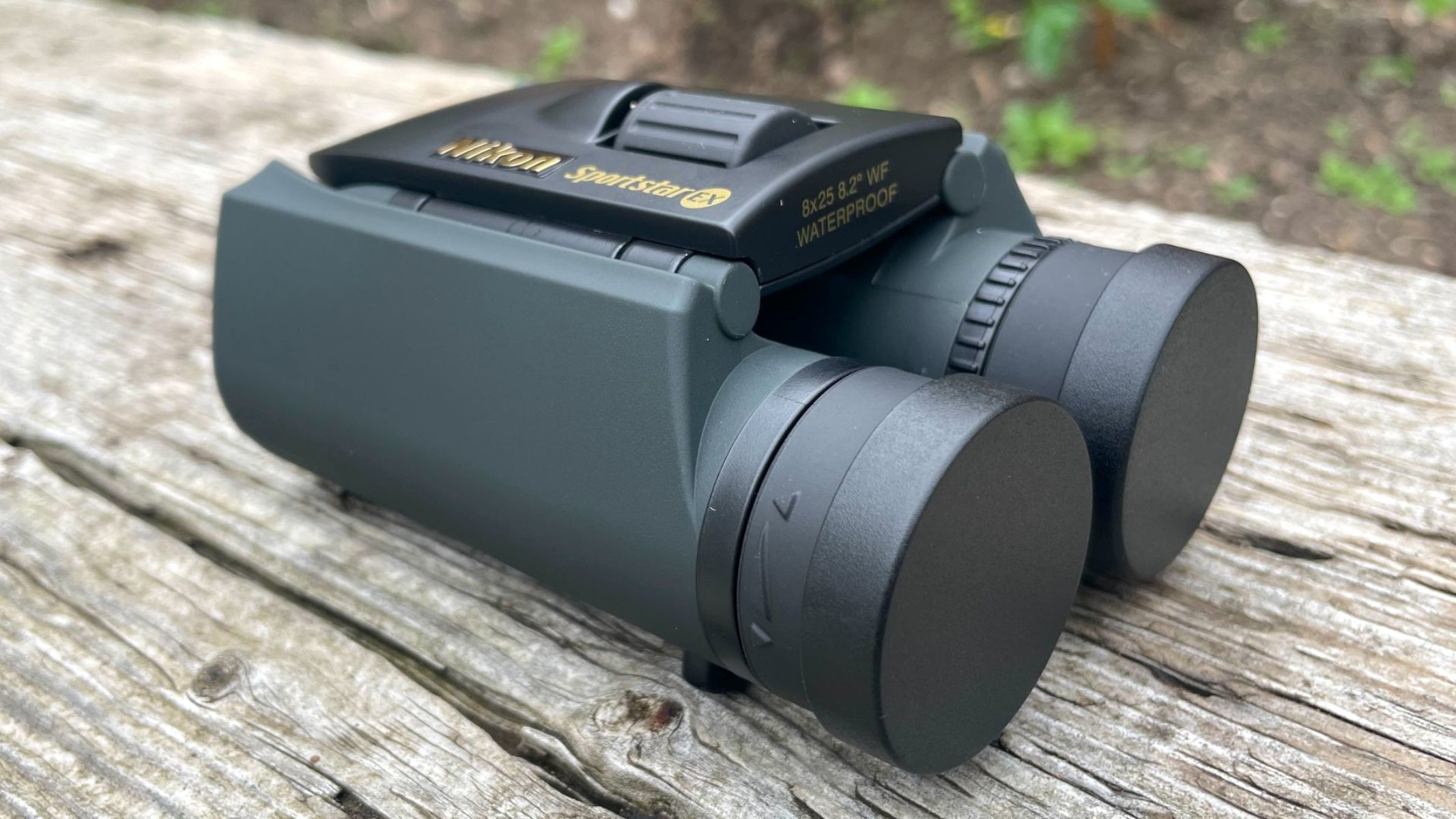
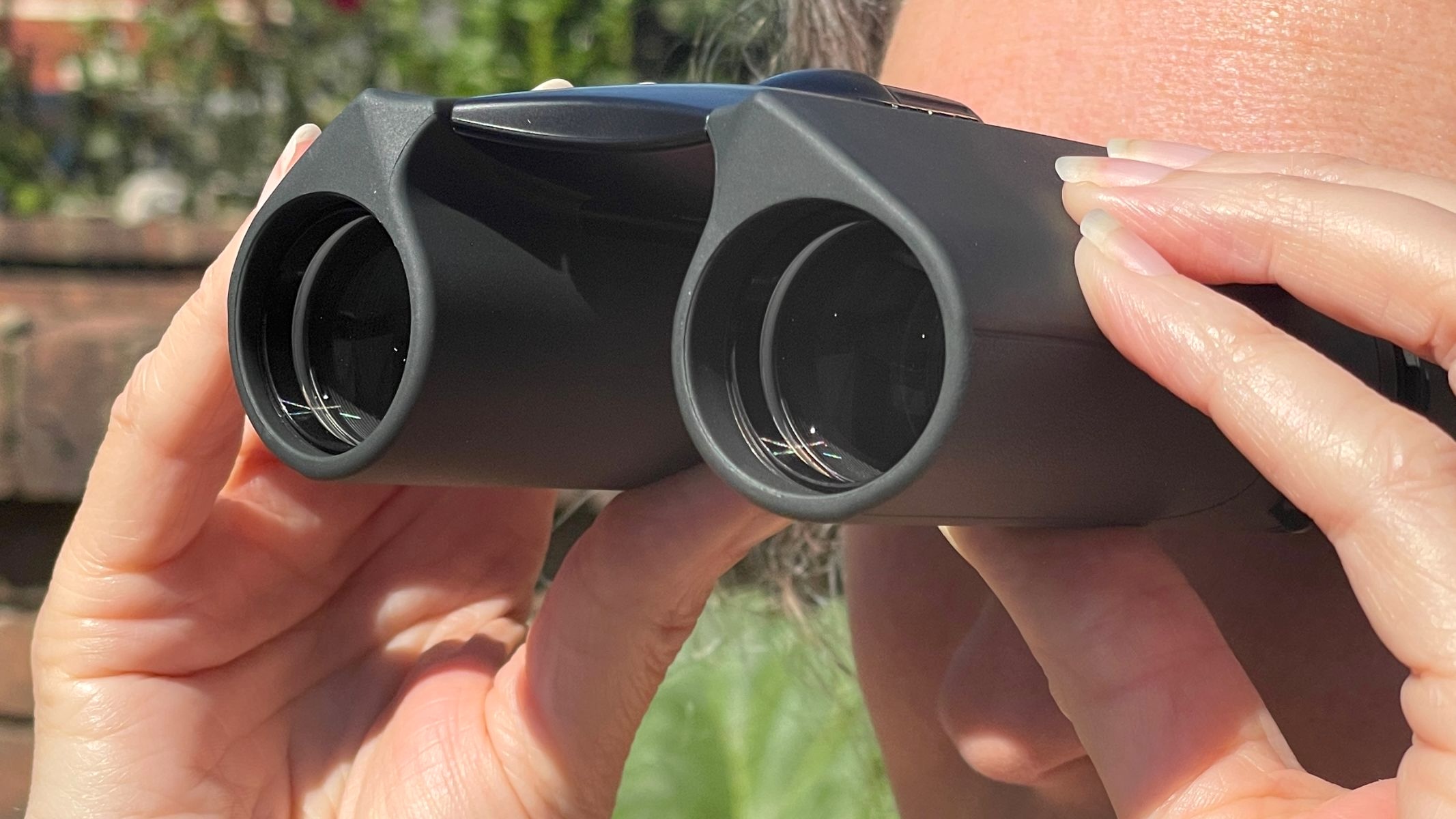
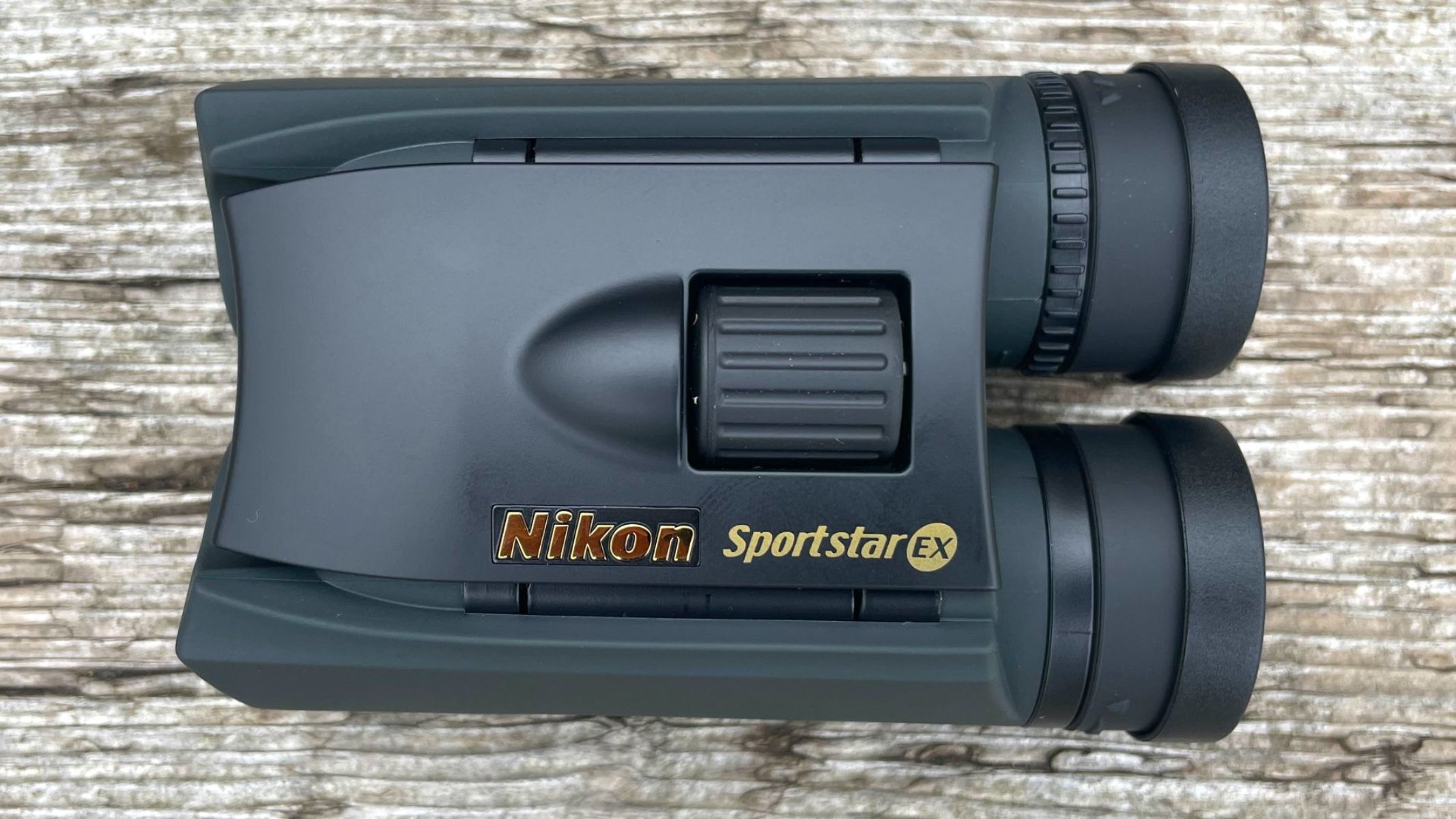
Nikon Trailblazer 8x25
Our expert review:
Specifications
Reasons to buy
Reasons to avoid
✅ You want to invest in something that will last. These binoculars are durable and water resistant, making them Great as a gift for a young teen.
✅ You want excellent general-use binoculars: These are great multitaskers, perfect for birdwatching or watching sports.
✅ You want a compact pair: You won't even notice them in your rucksack.
❌ You want binoculars for astronomy: There are better specialist binoculars available. They will serve, but only to a point.
❌ You wear spectacles: The twist-up eyecups don't lay flat and lack tension for specific positioning, reducing your field of view.
🔎Nikon Trailblazer 8x25: These are fantastic multipurpose binoculars that will stand up well to a bit of abuse. They can withstand the rain and are small enough to slip into a pocket. ★★★½
These binoculars are a sleek, modern option that is likely to appeal to younger teens who are looking for some higher-tech equipment for their hobbies. With 8x magnification, they are great for birdwatching, watching sports and even stargazing (although perhaps not enough for a more serious skywatcher).
If your teen is an adventurous sort, these might be the perfect fit for their first pair of 'grown-up' binos. They are waterproof, fog-proof and suitable for hiking, making them an ideal companion for a keen trail walker or camper. They offer a wide field of view of 8.2 degrees, so are good for viewing landscapes and are often sold as hunting binoculars for this reason. The turn-and-slide rubber eyecups make for comfortable viewing, though the eye relief isn't really enough to accommodate glasses at only 10mm.
They are affordable, selling for around $70, so if they are dropped, it won't be as big a financial blow as if your teen were borrowing your big, expensive binoculars. They have good ratings on Amazon, with an average rating of 4.7 out of 5 stars and 80% of users giving them the full 5 stars. Users note that the portability, clarity and price are all positives for this pair of binoculars.
They only weigh 9.9 oz (280g), so they're light and compact enough to fit in a pocket or take up minimal space in a backpack, as well as being comfortable to grip for smaller hands.
Attributes | Notes |
|---|---|
Design | These sleek bincoulars are multi-coated |
Performance | 8x magnification makes them suitable for multiple things |
Functionality | Particularly great for hiking, they are waterpoof and fogproof. |
Skywatching highlights
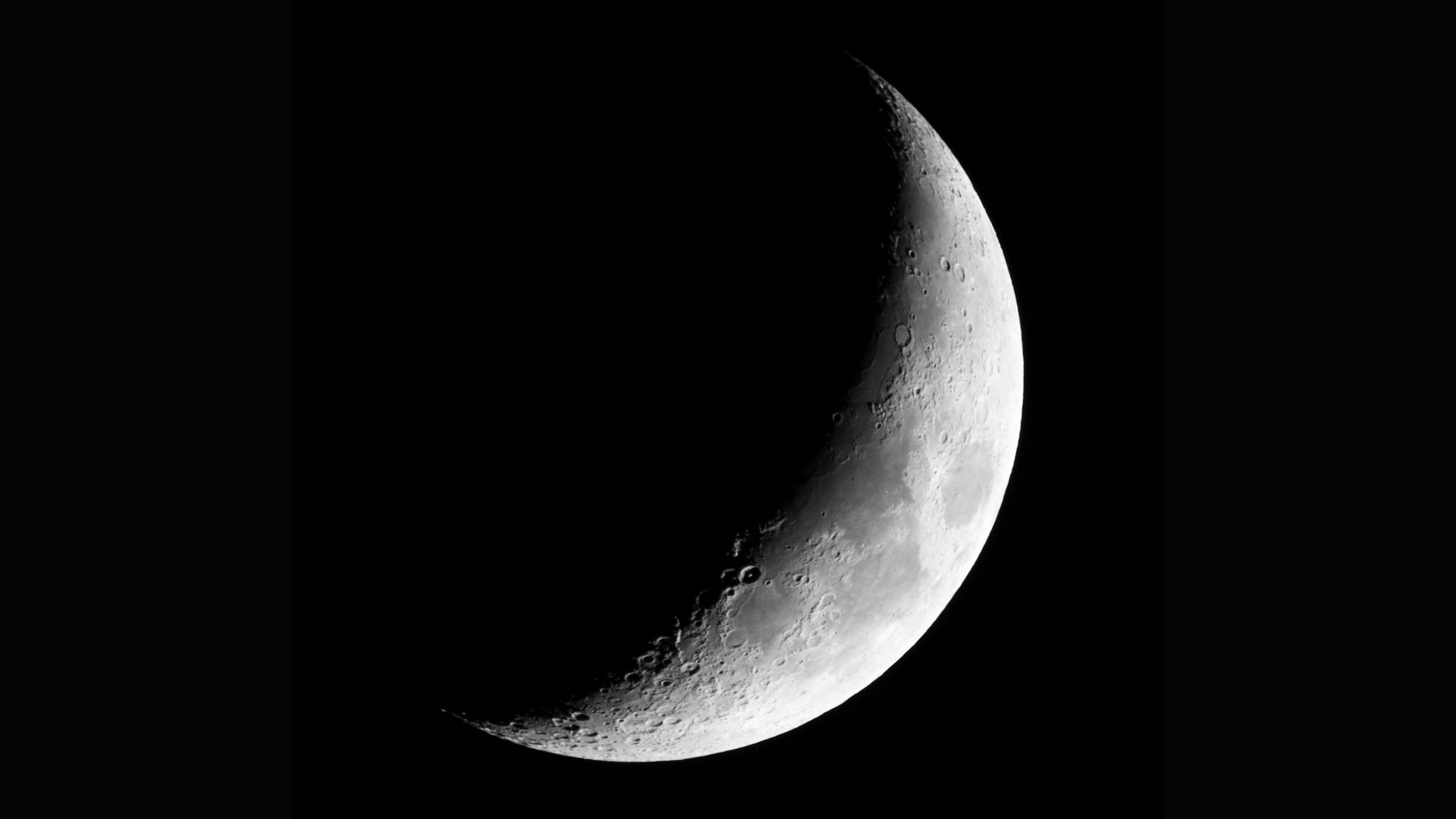
Jan. 22 — Celestial conjunction of Saturn and the moon
Young skywatchers are in for a treat on January 22 as a celestial conjunction will take place — they will be able to see Saturn, glowing golden, close to the waxing crescent moon. This event will be observable by the naked eye, but for a more intimate experience, a pair of binoculars will enhance your view.
Jan, 30 — Moon and Jupiter close by
On January 30, you will be able to see Jupiter close to the moon. The moon will be approaching full, with the Snow Moon appearing on February 1, but there will still be decent views of Jupiter. And a pair of binoculars will certainly offer better views than can be captured with the naked eye.

Feb. 1 — Full Snow Moon
February's full moon is also known as the Snow Moon. Children may love to see the moon's lunar geography close up with a pair of binoculars — perhaps they'll be able to spot some craters!

Jamie is an experienced science, technology and travel journalist and stargazer who writes about exploring the night sky, solar and lunar eclipses, moon-gazing, astro-travel, astronomy and space exploration. He is the editor of WhenIsTheNextEclipse.com and author of A Stargazing Program For Beginners, and is a senior contributor at Forbes. His special skill is turning tech-babble into plain English.
Best binoculars for kids Frequently Asked Questions
When is Amazon Prime Day Big Deals Days in October?
It was Tuesday Oct. 7 and Wednesday Oct. 8. Take a look at our Prime Day hub to see some of the best deals we came across. We'll have another hub next month, for Black Friday.
Which are the best binoculars for kids?
The Canon 10x42L IS WP Binocular are the best binoculars for kids and have in-built image stabilization but they are reserved for those with big budgets. Those with older kids to buy for should take a look at the Celestron SkyMaster 12x60 Binocular.
What is better 8x or 10x binoculars for kids?
8x magnification binoculars are better for kids that are happy to see a wider field of view. But a slight boost to 10x will help children spot subjects close-up and better fill the view (provided the field of view is narrower). Anything more than that and you'll need something that is tripod adaptable to prevent frustrating wobble.
Why do kids see better in the dark with binoculars?
Children can see better in the dark than adults. Their pupils can dilate wider, improving their night vision by increasing light-gathering power. They also have more rods — light-sensitive cells on the retina that aid low-light viewing — making it possible to give a child smaller binoculars that are easier to carry and hold but allow less light in than yours. They'll still see a glistening night sky, whereas, with the same pair, it might not look as impressive to an adult.
How do I know which binoculars are best for children?
Binoculars can be a great starting point for budding young astronomers and nature watchers. And if you're looking for a hook to get them into skywatching, a good pair of binoculars can make this January's cosmic display even better.
However, there are some things to consider before buying binoculars for children. And, above all, be wary of 'toy binoculars.' They are much cheaper and generally more visually appealing to children (often found in toy stores), but their performance will be much different from the standards of 'proper binoculars' and will therefore affect enjoyment and learning. You may end having to buy a proper pair later, essentially wasting your money. So knowing what to look for in a pair of kids' binoculars is essential.
What features should I look for in a kids binocular?
A few key features to look for in children's binoculars are:
1. Make sure the binoculars aren't too heavy or bulky for a child to hold steady. If they are, ensure they have a tripod adapter.
2. Magnifications of 7x to 10x are generally the best for skywatching.
3. Porro prisms and BaK-4 glass are best for stargazing.
4. Foldable designs are convenient and portable.
It's worth checking how much you can physically adjust the binoculars. Binoculars have a degree of flex to better fit individual faces, particularly the distance between the eyes (this is called the interpupillary distance). The more flex, the more likely they will fit a smaller face comfortably.
How heavy should kids binoculars be?
We recommend pairs weighing less than 10 oz (283g) for young children (four to seven years). Older kids and teenagers can generally handle standard-sized binoculars well but can still benefit from a more lightweight pair with lower magnification so as not to experience too much wobble.
Binoculars can tire even grownup users with prolonged use, so it's important to factor in weight when choosing a pair for a child. Children can struggle to keep an image steady with even mid-weight binoculars.
What is the best magnification for binoculars for kids?
If the weight of your binoculars can cause image shake and affect the stability of your view, so too can magnification. High-powered binoculars with a magnification above 8x can make it tough for smaller hands to keep the view steady, as any movement from the hands also gets multiplied by the magnification amount. Since a shaky image can prove frustrating and ultimately bore younger users, having low-powered, stable binoculars can enhance their enjoyment.
Lower-magnification binoculars also produce a wider field of view than high-powered/higher-magnification binoculars, with several benefits for all users, especially children. High-powered binoculars zoom in closer to the subject you're looking at, but low-powered binoculars, with a wider field of view, make finding objects quickly much easier. They also help locate fast-moving objects such as birds (as they are in the frame for longer) and can significantly improve a beginner’s coordination and accuracy.
My kid struggles to hold binoculars steady, what should I do?
Here are some tips from our page on How to Hold Binoculars Steady.
1. Get a comfortable, firm grip on the binoculars
2. Tuck the elbows into the body, preferably against the ribcage or place them on something stationary like a wall or fence.
3. Use a tripod with a binocular mount for prolonged use with heavier binoculars.
What size aperture should binoculars for children have?
The bigger the better for low light viewing, but kids can see better in the dark than adults so this is less important for young observers.
The aperture of binoculars refers to the diameter of the front lenses and affects the amount of light that reaches the rear lenses. It is the second number after the magnification and is written in millimeters. So, a pair of binoculars that are rated at 7x30 offers a magnification of x7 and a diameter of 30mm.
That aperture can make a big difference to the experience of using binoculars, especially in low light and at night, so we recommend using a pair of binoculars with a 40mm or above aperture to let in more light, especially for night-time stargazing.
Essentially, larger objective lenses mean brighter images. The best binoculars will have fully multi-coated optics and BaK-4 glass (rather than BK7). There are cheaper instruments available, which will still give enthralling views of the heavens, but you won't be getting the absolute best image possible.
How durable are kids binoculars?
The models reviewed and rated in our guide take durability into account. Kids are typically still developing motor skills so a pair of binoculars for kids may take a tumble more often than a pair for adults.
Anything can happen when you're out in the field, so to prolong the life of your binoculars and ensure the best possible user experience for as long as possible, it's sensible to purchase the most durable pair that meets your needs. This doesn't have to mean the most expensive, as many, including those above (like the Celestron SkyMaster 12x60), come with some form of protective rubber coating, and some are even waterproof, dustproof, and fog proof (these will list nitrogen purged as a specification).
Anything that minimizes accidental damage can only reduce your worry and add to your child's enjoyment of binoculars and the incredible views of nature and the sky above that binoculars can open up. Look for binoculars that come with a neckstrap so they don't end up on the floor by accident.
How much do the best binoculars for kids cost?
We'd say anywhere between $30 and $150. The National Geographic 6x21 children's binocular are available at the time of writing for just $30 whereas the Celestron Nature DX 8x32 are around $150. However, the Canon 10x42L IS WP Binocular are the best pair we've tested in this round-up but come in at around $1300.
Update log
Editor's note 1/21/26: Changed all mentions of 2025 to 2026, added skywatching highlights section and referenced it in the introduction.
How we test the best binoculars for kids
To guarantee you're getting honest, up-to-date recommendations on the best binoculars for kids to buy here at Space.com we make sure to put every binocular through a rigorous review to fully test each instrument. Each binocular designed for kids is reviewed based on a multitude of aspects, from its construction and design, to how well it functions as an optical instrument and its performance in the field.
Each pair of binoculars is carefully tested by either our expert staff or knowledgeable freelance contributors who know their subject areas in depth. This ensures fair reviewing is backed by personal, hands-on experience with each binocular and is judged based on its price point, class and destined use.
We look at how easy they are to operate, whether eye relief can be adjusted for spectacles wearer if a binocular comes with appropriate accessories or carry bags and also make suggestions if a particular set of binos would benefit from any additional kit to give you the best viewing experience possible.
With complete editorial independence, Space.com are here to ensure you get the best buying advice on binoculars for kids, whether you should purchase an instrument or not, making our buying guides and reviews reliable and transparent.
Breaking space news, the latest updates on rocket launches, skywatching events and more!

Jamie is an experienced science and travel journalist, stargazer and eclipse chaser who writes about exploring the night sky, solar and lunar eclipses, the Northern Lights, moon-gazing, astro-travel, astronomy and space exploration. He is the editor of WhenIsTheNextEclipse.com, author of A Stargazing Program For Beginners, co-author of The Eclipse Effect, and a senior contributor at Forbes.
- Chris McMullenContributing Writer
- Jase Parnell-BrookesManaging Editor, e-commerce
- Harry BennettE-commerce Staff Writer
